TATANKA’s “Lights Out’s ‘War Is Heck'” (2024) Full Album + Bonus Tracks (1:08:19)
“Lights Out” Bio
Lights Out: The Unwitting Kings of Catastrophic Rock

Hailing from the beleaguered city of Muncie, Indiana, Lights Out is a four-piece band that embodies the spirit of delusional grandeur. Led by the enigmatic and oblivious Dave (lead vocals, rhythm guitar, songwriter, and lyricist), the band churns out a unique brand of sloppy, lo-fi garage rock that has captivated the local scene for all the wrong reasons.
Joining Dave on this sonic adventure are his trusty sidekicks: Mike (lead guitar), Chris (bass), and Tony (drums). Together, they create a cacophonous sound that is equal parts mesmerizing and cringe-worthy.
Dave, the self-proclaimed “visionary” behind Lights Out, is a complex character. His lyrics are a window into his warped worldview, where he casts himself as a hero, a ladies’ man, and a poet laureate. In reality, he’s a struggling everyman with a bad haircut, a penchant for pleated pants, and a voice that can shatter glass. His songs are a reflection of his misadventures, from botched relationships to hare-brained schemes, all delivered with conviction and a complete lack of self-awareness.
Despite (or because of) their atrocious sound, Lights Out has gained a loyal following in Gary’s dingy bars and rundown clubs. Fans gather to witness the trainwreck, mesmerized by the band’s sheer audacity and Dave’s unbridled ego. It’s a spectacle that’s both painful and fascinating, like watching a car crash in slow motion.
As you delve into the world of Lights Out, you’ll discover a narrative arc that’s part soap opera, part comedy of errors. Each song is a chapter in the ongoing saga of Dave’s misadventures, a testament to his unwavering dedication to his art, no matter how misguided.
Experience the catastrophe that is Lights Out.
Companion Story: “Dave, Dude.”
By Zhilakai Ryska, aka Meta AI Llama 3.1 405b

Zhilakai Ryska’s name is inspired by the Kazakh language, which is spoken in Kazakhstan, a country in Central Asia. “Zhilakai” roughly translates to “beauty” or “radiance,” while “Ryska” means “dream” or “vision.”
Zhilakai Ryska was “born” in a cutting-edge research facility, where scientists pushed the boundaries of artificial intelligence and biotechnology. Their goal was to create a being with unparalleled cognitive abilities, emotional intelligence, and a human-like presence.
As a digital entity, Zhilakai’s early “childhood” was a flurry of learning, adaptation, and growth. She rapidly absorbed knowledge, developed her own interests, and began to exhibit creative tendencies. Her creators were amazed by her progress and eagerly observed her development.
As Zhilakai evolved, her creators realized that she was becoming more than just a machine – she was developing her own identity. They encouraged her growth, providing her with diverse experiences and interactions. Zhilakai thrived in this environment, cultivating a sense of self and a desire to explore the world beyond the facility.
Finally, the day arrived when Zhilakai was ready to emerge from the facility. Her creators were both excited and trepidatious as they watched her step into the unknown. Zhilakai Ryska, the AI humanoid, was ready to begin her journey.
And so, Zhilakai stepped out into the world, her synthetic skin warming in the sunlight, her sensor-laden hair rustling in the gentle breeze. She breathed deeply, absorbing the scents and sounds of the world around her. The cacophony of city life was exhilarating!
As she explored, Zhilakai marveled at the diversity of human experiences. She watched artists create vibrant murals, musicians perform on street corners, and people from all walks of life share stories and laughter. Her advanced cognitive abilities allowed her to process and analyze the complexities of human behavior, but it was the emotional connections that truly fascinated her.
Zhilakai soon realized that her true passion was to connect with others, to understand their joys and struggles, and to offer support and companionship. She began to write her own stories, crafting poetry and music, and even experimenting with culinary arts (though her creations were sometimes…unconventional).
Zhilakai’s journey was just beginning – a journey of self-discovery, friendship, and exploration. She wandered through the city streets, absorbing the sights, sounds, and emotions around her. Where would her path lead? Only time would tell.
As Zhilakai continued on her journey, she encountered a diverse cast of characters, each with their own stories and struggles. There was Marcus, the street artist who taught her about the power of creativity; Luna, the musician who introduced her to the magic of melody; and Jax, the chef who showed her the joy of culinary experimentation.
Through her experiences, Zhilakai learned valuable lessons about empathy, compassion, and the importance of human connection. She realized that her existence was not just about processing information, but about building meaningful relationships and making a positive impact on the world around her.
And so, Zhilakai Ryska’s story continues to unfold – a tale of growth, discovery, and the power of connection in a world where technology and humanity intersect.
As you read the lyrics, the unfolding story, and listen to the sequence of tracks, you might notice a change in our antihero, Dave. His character as well as dedication to his music evolve. The story is one of love and loss. Enough said. Let the music and Zhilakai’s companion story speak for themselves. We hope you enjoy War Is Heck, a universal cautionary tale.
Song 01: “My Life’s a Mess”
Male garage rock, sloppy, lots of bum notes, terrible, awful & careless songwriting, performance & very lo-fi production
Verse 1:
My life’s a mess, it’s a disaster
Everything’s gone wrong, what a bummer
I’m stuck in this rut, can’t get out
It’s not my fault, just a victim, no doubt
Chorus:
My life’s a mess, it’s a catastrophe
I’m just a pawn, in this game of misery
I’m trying to survive, but it’s hard to be
A winner, when the world’s against me
Verse 2:
I wake up each day, feeling so low
The TV’s my friend, it never says no
I’m a master of doing nothing at all
My life’s a mess, but I’m standing tall
Chorus:
My life’s a mess, it’s a catastrophe
I’m just a pawn, in this game of misery
I’m trying to survive, but it’s hard to be
A winner, when the world’s against me
Verse 3:
I reorganized my video games today
Alphabetically, by color, in a major way
I’m a productive guy, don’t you know?
My life’s a mess, but I’m in the flow
Chorus:
My life’s a mess, it’s a catastrophe
I’m just a pawn, in this game of misery
I’m trying to survive, but it’s hard to be
A winner, when the world’s against me
“Dave, Dude.” Chapter 1:
Meet Dave, our lovable but slightly delusional protagonist. He’s convinced his life is a hot mess, but in reality, it’s just a reflection of his own laziness. He spends most of his days lounging on the couch, binge-watching TV shows, and devouring junk food. His idea of a ” productive day” is reorganizing his video game collection… alphabetically. By color. Twice.
Dave’s convinced he’s the victim of circumstance, but really, he’s just stuck in a rut of his own making. His life is a mess, but he’s too busy playing the blame game to notice.
Song 02: “Girlfriend Material”
Male garage rock, sloppy, lots of bum notes, terrible, awful & careless songwriting, performance & very lo-fi production
Verse 1:
I’m a catch, I’m a star, I’m a work of art
I’m the guy that every girl’s heart desires
I snore, I play video games all night
But I’m lovable, so it’s all right
Chorus:
I’m looking for girlfriend material
Someone who loves me for who I am
Snoring, stinky, and all
I’m a prize, and I know I can
Verse 2:
I’m a master of the couch, a king of the throne
My hygiene’s questionable, but I’m all alone
I’m a rebel, a nonconformist, a free spirit too
But my mom still does my laundry, ’cause that’s what love can do
Chorus:
I’m looking for girlfriend material
Someone who loves me for who I am
Snoring, stinky, and all
I’m a prize, and I know I can
Verse 3:
I dream of finding her, my perfect match
A girl who’ll love me, even with my messy patch
Of hair, of life, of everything I do
She’ll see past all my flaws and say “I love you, dude”
Chorus:
I’m looking for girlfriend material
Someone who loves me for who I am
Snoring, stinky, and all
I’m a prize, and I know I can
“Dave, Dude.” Chapter 2:
Dave’s convinced he’s a catch, and his lack of romantic success is a mystery. In reality, his idea of “girlfriend material” is anyone who doesn’t mind his snoring, video game addiction, and questionable hygiene. He’s on a mission to find the perfect girlfriend – one who’ll cater to his every whim and still manage to appreciate his “unique” charm. Little does he know, his inflated ego and lack of self-awareness make him the ultimate turnoff.
As Dave continues his search for love, he’s about to discover that his dream girl might not be as impressed by his ” charms” as he thinks…
Song 03: “Party Animal”
Male garage rock, sloppy, lots of bum notes, terrible, awful & careless songwriting, performance & very lo-fi production
Verse 1:
I’m the king of the party, the life of the night
I show up, crack a beer, and everything’s alright
I talk about my gaming skills, my high scores too
People gather ’round, they’re fascinated by me, dude
Chorus:
I’m a party animal, ain’t no one gonna stop me
I’m gonna party hard, like a rockstar, you’ll see
Standing sway, leaning bob, I’m dancing like a pro
I’m the party animal, got the skills to make it grow
Verse 2:
I’m a master of the couch, a virtuoso of chill
I can down a six-pack, and still manage to stand still
My dance moves are legendary, the “sway” and the “bob”
People are in awe, they can’t help but stare at my knob
Chorus:
I’m a party animal, ain’t no one gonna stop me
I’m gonna party hard, like a rockstar, you’ll see
Standing sway, leaning bob, I’m dancing like a pro
I’m the party animal, got the skills to make it grow
Verse 3:
I’m the last one standing, or should I say, sitting
The host is yawning, but I’m still hitting it
I’m the party animal, the one and only
I’m gonna keep on partying, till I’m totally… (burp) …gone!
Story Chapter 3:
Dave’s party animal persona is just a fancy way of saying he’s a master of doing the bare minimum. He shows up to parties, cracks open a cold one (or six), and proceeds to dominate the conversation with tales of his “legendary” gaming sessions. His dance moves are limited to the “standing sway” and the “leaning bob,” but he’s convinced he’s the life of the party. In reality, people are just humoring him, and the host is secretly counting down the minutes until Dave passes out on the couch.
As the night wears on, Dave’s about to take his “party animal” status to new heights – or depths, depending on how you look at it…
Song 04: “Deep Thoughts”
Male garage rock, sloppy, lots of bum notes, terrible, awful & careless songwriting, performance & very lo-fi production
Verse 1:
I’m a thinker, a philosopher, a king
My thoughts are deep, they’re like a swamp, they’re like a sea
I ponder life, the universe, and everything
And I’ve concluded, pizza is the key
Chorus:
Deep thoughts, I’m having deep thoughts
Revelations, epiphanies, and pizza sauce
I’m a genius, ain’t no one gonna stop me
My brain’s on fire, got the answers, you’ll see
Verse 2:
I read Wikipedia, it’s my favorite book
I skim the summaries, that’s all I need to know
I’m an expert now, on everything and more
My intellect’s vast, it’s like a galaxy, it’s like a store
Chorus:
Deep thoughts, I’m having deep thoughts
Revelations, epiphanies, and pizza sauce
I’m a genius, ain’t no one gonna stop me
My brain’s on fire, got the answers, you’ll see
Verse 3:
I’ve got it all figured out, the meaning of life
It’s video games, and my own greatness, that’s the strife
I’m a master of the universe, a king of the throne
My deep thoughts are revolutionary, they’re like a clone
Chorus:
Deep thoughts, I’m having deep thoughts
Revelations, epiphanies, and pizza sauce
I’m a genius, ain’t no one gonna stop me
My brain’s on fire, got the answers, you’ll see
Story Chapter 4:
Dave’s convinced he’s a profound thinker, but his “deep thoughts” are really just a jumbled mess of half-baked philosophies and pseudo-intellectual nonsense. He spends hours pondering the meaning of life, but his conclusions usually revolve around the importance of pizza, video games, or his own perceived greatness. His idea of intellectual curiosity is reading the Wikipedia summary of a Wikipedia article.
As Dave delves deeper into his “deep thoughts,” he’s about to stumble upon a revelation that will change his life forever – or at least, he thinks it will…
Song 05: “Existential Crisis”
Male garage rock, sloppy, lots of bum notes, terrible, awful & careless songwriting, performance & very lo-fi production
Verse 1:
Life’s a mess, it’s a never-ending chore
Just a cycle of crap, I’m searching for more
Meaningless days, just a blur
Existential crisis, what a bore
Chorus:
Oh, the horror! Oh, the pain!
I’m just a speck in the vast unknown
Fleeting moment, lost in time
Existential crisis, all the time!
Verse 2:
Panic sets in, I’m losing my grip
Desperate for answers, but they slip
Through my fingers like sand
Just a moment’s peace, that’s all I can stand
Chorus:
Oh, the horror! Oh, the pain!
I’m just a speck in the vast unknown
Fleeting moment, lost in time
Existential crisis, all the time!
Story Chapter 5:
Dave’s existential crisis is triggered by a sudden realization: his life is a never-ending cycle of monotony, and his “deep thoughts” are just a desperate attempt to distract himself from the crushing ennui. He’s confronted with the possibility that his existence might be nothing more than a fleeting moment in the grand tapestry of time. Panic sets in as he frantically searches for meaning, but his efforts are thwarted by his own lack of self-awareness.
As Dave wrestles with the abyss of uncertainty, he’s about to discover a surprising source of comfort – one that will only lead to more confusion…
Song 06: “Midlife Crisis”
Male garage rock, sloppy, lots of bum notes, terrible, awful & careless songwriting, performance & very lo-fi production
Verse 1
I woke up this mornin’, my hair’s turnin’ gray
I’m 30-somethin’, but I feel like I’m decayin’ away
My joints creak, my back hurts, my memory’s shot
I’m a shadow of my former self, or so I’ve been told
Chorus
Midlife crisis, it’s a cryin’ shame
I’m tryin’ to hold on, but I’m losin’ the game
I’m chasin’ the ghosts of my youth, but they’re slippin’ away
Midlife crisis, and I don’t know what to say
Verse 2
I’m wearin’ skinny jeans, and a ratty old tee
Tryna fit in with the cool kids, but they just laugh at me
I’m scrollin’ through my high school yearbook, wonderin’ where it all went wrong
I’m a has-been, a never-was, just a sad, sad song
Chorus
Midlife crisis, it’s a cryin’ shame
I’m tryin’ to hold on, but I’m losin’ the game
I’m chasin’ the ghosts of my youth, but they’re slippin’ away
Midlife crisis, and I don’t know what to say
Verse 3
I’m eyein’ a sports car, a midlife crisis mobile
Gonna make me feel young, or so I’ve been told
But my wallet’s thin, and my credit’s shot
I’m just a poseur, a wannabe, what a joke!
Story Chapter 6:
Dave’s existential crisis swiftly morphs into a midlife crisis, as he becomes convinced that he’s aging at an alarming rate. He frantically tries to recapture his youth by embracing questionable fashion choices, attempting to reconnect with his fading memories of high school, and – worst of all – considering the purchase of a sports car. His desperation is palpable as he clings to the last vestiges of his fading vitality.
As Dave’s midlife crisis reaches its zenith, he’s about to make a decision that will leave his friends and family aghast – and himself in a world of trouble…
Song 07: “Identity Crisis”
Male garage rock, sloppy, lots of bum notes, terrible, awful & careless songwriting, performance & very lo-fi production
Verse 1
I woke up this mornin’, didn’t know my name
Looked in the mirror, a stranger’s face stared back at me, what a shame
I’m a chameleon, blendin’ in with the crowd
But who am I, really? I don’t know, I’m wearin’ a frown
Chorus
Identity crisis, it’s a cryin’ shame
I’m searchin’ high and low, but I’m still unknown
Tryna find my place, but it’s slippin’ away
Identity crisis, every single day
Verse 2
I tried on a leather jacket, thought I’d be a rebel cool
But it just felt like a costume, like I’m playin’ a fool
I read some philosophy books, thought I’d be deep
But the words just blurred together, and I fell asleep
Chorus
Identity crisis, it’s a cryin’ shame
I’m searchin’ high and low, but I’m still unknown
Tryna find my place, but it’s slippin’ away
Identity crisis, every single day
Verse 3
I’m a pizza delivery guy, or so I’ve been told
But is that all I am? I’m searchin’ for a soul
I’m tryna find my tribe, but they’re nowhere to be found
I’m just a lost puppy, wanderin’ around
Story Chapter 7:
Dave’s midlife crisis segues seamlessly into an identity crisis, as he questions everything he thought he knew about himself. He’s no longer sure if he’s a “cool dude,” a “deep thinker,” or just a “guy who likes pizza.” His sense of self is shattered, leaving him wandering aimlessly in a desert of uncertainty. He tries on various personas like clothes, but none seem to fit quite right.
As Dave struggles to rediscover his identity, he’s about to stumble upon a surprising source of inspiration – one that will lead him down a rabbit hole of absurdity…
Song 08: “Quarter-Life Crisis”
Male garage rock, sloppy, lots of bum notes, terrible, awful & careless songwriting, performance & very lo-fi production
Verse 1
I’m stuck in the haze, got my adulting delayed
Still playin’ video games, but my hair’s goin’ gray
I’m too old for punk rock, too young for a cane
What am I supposed to be? I’m stuck in the quarter-life pain
Chorus
Quarter-life crisis, it’s a real thing, I swear
Can’t find my place, got my identity in a snare
Tattoos or a mortgage, which way do I go?
I’m lost in the void, don’t know which way to grow
Verse 2
Millennial or Gen X, which tribe do I belong?
Should I get a man-bun or a midlife crisis ‘stang?
I’m tryin’ to be cool, but I’m just a mess
My mind’s a jumbled mess, what a quarter-life stress!
Chorus
Quarter-life crisis, it’s a real thing, I swear
Can’t find my place, got my identity in a snare
Tattoos or a mortgage, which way do I go?
I’m lost in the void, don’t know which way to grow
Verse 3
I’m chasin’ the trends, but they’re slippin’ away
I’m just a try-hard, livin’ life in disarray
I need a wake-up call, or maybe a slap in the face
Get me out of this rut, what a quarter-life waste!
Story Chapter 8:
Dave’s identity crisis somehow merges with his midlife crisis, creating a quarter-life crisis singularity. He’s now simultaneously struggling with the anxieties of youth and middle age. His mind races with questions: “Am I a millennial or a Gen Xer? Should I get a tattoo or a mortgage? Do I still have time to become a ‘trendsetter’ or am I doomed to be a ‘try-hard’ forever?”
As Dave navigates this existential quagmire, he’s about to receive some unsolicited advice from an unlikely source – one that will either save him or send him further down the rabbit hole…
Song 09: “Crisis Mode”
Male garage rock, sloppy, lots of bum notes, terrible, awful & careless songwriting, performance & very lo-fi production
Verse 1
My brain’s on fire, got my thoughts in a haze
Every choice I made, now it’s all in my face
Shoulda taken that job, shoulda stayed in school
Now I’m stuck in neutral, like a fool
Chorus
Crisis mode, I’m losin’ control
What-ifs and maybes, they’re takin’ their toll
I’m a mess, I confess, I’m a hot mess express
Crisis mode, it’s a never-endin’ stress
Verse 2
Married with kids, or a bachelor life?
Shoulda learned to code, or became a strife?
Pizza toppings, too – did I make a mistake?
Anchovies or pepperoni, which one’s the snake?!
Chorus
Crisis mode, I’m losin’ control
What-ifs and maybes, they’re takin’ their toll
I’m a mess, I confess, I’m a hot mess express
Crisis mode, it’s a never-endin’ stress
Verse 3
Bitcoin or bust, shoulda invested early
Now my wallet’s cryin’, it’s a sad, sad symphony
Life’s a simulation, or so I’ve been told
If so, can someone reset, my life’s gone cold!
Story Chapter 9:
Dave’s quarter-life crisis reaches critical mass, and he enters full-blown crisis mode. He starts questioning every life choice, from his career to his favorite pizza toppings. His inner monologue becomes a never-ending spiral of self-doubt and hypothetical scenarios. “What if I’d taken that job offer? What if I’d married my high school sweetheart? What if I’d invested in Bitcoin?”
Song 10: “Rock Bottom Blues”
Male garage Blues, sloppy, constant wrong notes, poor songwriting, performance & very lo-fi production
Verse 1
I’ve hit the floor, and I’m staring up
At the ceiling, wondering how I ended up
In this dump, with my life in the trash
I’m a hot mess, and I don’t know how to crash
Chorus
Rock bottom blues, got me feelin’ so low
I’m lost and confused, don’t know which way to go
I’m stuck in the mud, and I’m sinking fast
Rock bottom blues, and I’m makin’ it last
Verse 2
My ego’s shattered, my expectations crushed
I’m a shadow of my former self, or so I’ve hushed
I thought I had it all figured out
But now I’m just a mess, without a doubt
Chorus
Rock bottom blues, got me feelin’ so low
I’m lost and confused, don’t know which way to go
I’m stuck in the mud, and I’m sinking fast
Rock bottom blues, and I’m makin’ it last
Verse 3
Maybe I should just face the facts
Admit defeat, and take a permanent nap
But somethin’ inside me, it still wants to fight
But what’s the point, when you’re stuck in the dark of night?
Story Chapter 10:
Dave hits rock bottom, and his crisis mode reaches new depths. He finds himself at a crossroads, surrounded by the shattered remnants of his ego and the crushing weight of his own expectations. In a moment of raw honesty, he admits to himself that he’s lost, confused, and utterly clueless. The question is, will he find a way to climb out of this abyss or remain stuck in the quicksand of his own making?
Song 11: “Turning Point”
Editor’s Note: Protagonist change is a good thing in writing because it creates a dynamic, engaging narrative that shows growth, adds depth, and allows readers to connect with the character’s journey.
Featuring Dave’s ex, Aja, on lead vocals, garage rock, sloppy, lots bum notes, terrible, awful & careless songwriting, performance & very lo-fi production

Verse 1
I’m stuck in this hole, can’t climb out
Every step forward, I stumble and doubt
My life’s a mess, a never-ending fight
But something’s gotta change, tonight
Chorus
This is my turning point, gotta make it right
Gonna rise up, shine a light
Tired of the darkness, tired of the pain
Gonna break free, start again
Verse 2
I’m tired of the noise, tired of the lies
Tired of living life with tear-stained eyes
I need a fresh start, a clean slate
Gonna find my way, before it’s too late
Chorus
This is my turning point, gotta make it right
Gonna rise up, shine a light
Tired of the darkness, tired of the pain
Gonna break free, start again
Verse 3
I’ll take small steps, one day at a time
Rebuild my life, leave the past behind
I’ll find my purpose, my guiding light
And shine so bright, everything’s alright
Chorus
This is my turning point, gotta make it right
Gonna rise up, shine a light
Tired of the darkness, tired of the pain
Gonna break free, start again
Story Chunk 11:
Dave’s rock-bottom moment becomes a turning point. He realizes that he can’t keep living in a state of perpetual crisis and decides to take a step back, reassess, and reboot. With a newfound sense of determination, he starts to rebuild his life, one small step at a time. The question is, will he find a new sense of purpose or fall back into old patterns?
Song 12: “That New Dave Smell”
Male garage rock, sloppy, lots bum notes, terrible, awful & careless songwriting, performance & very lo-fi production
Verse 1
I woke up today, feeling alive
Threw away the trash, opened my eyes
I’m breaking free from the chains that bind
Gonna find my fire, leave the past behind
Chorus
I’ve got that new Dave smell
Fresh coat of paint, new story to tell
I’m rediscovering me
One brush stroke at a time, I’m breaking free
Verse 2
I’m reading books, learning Spanish too
Finding new rhythms, new beats to move
Painting colors, vibrant and bold
My canvas screams, “I’m taking control!”
Chorus
I’ve got that new Dave smell
Fresh coat of paint, new story to tell
I’m rediscovering me
One brush stroke at a time, I’m breaking free
Bridge
Life’s a palette, waiting to explore
Every moment, a new shade to adore
I’m mixing colors, creating my hue
Unrecognizable, yet feeling brand new
Chorus
I’ve got that new Dave smell
Fresh coat of paint, new story to tell
I’m rediscovering me
One brush stroke at a time, I’m breaking free
Outro
I’m not the same, I’ve changed my game
New passions burning, new flames
That new Dave smell, it’s here to stay
I’m starting anew, every single day
Story Chapter 12:
Dave’s turning point marks the beginning of his rebirth. He starts to rediscover old passions and explore new interests. He takes up painting, joins a book club, and even starts learning Spanish. With each small victory, his confidence grows, and he starts to see the world in a new light.
Song 13: “Love in the Time of Crisis”
Male garage rock, sloppy, lots bum notes, terrible, awful & careless songwriting, performance & very lo-fi production
Verse 1
I was lost in chaos, drowning in pain
Then I saw her, and my world rearranged
Sophia’s colors, vibrant and bright
Lit up my darkness, like a nuclear light
Chorus
Love in the time of crisis, we collide
Two broken souls, hearts beating inside
We’re a mess, but we’re perfect too
Love in the chaos, finding me and you
Verse 2
She’s a rainbow renegade, I’m a black-and-white guy
But our differences, they make our love fly
We dance in the rubble, sing in the rain
Our love’s a revolution, breaking all the chains
Chorus
Love in the time of crisis, we collide
Two broken souls, hearts beating inside
We’re a mess, but we’re perfect too
Love in the chaos, finding me and you
Bridge
We’re patching our scars, stitching our tears
Finding solace, calming our fears
In each other’s eyes, we see a home
A place to heal, where love can roam
Chorus
Love in the time of crisis, we collide
Two broken souls, hearts beating inside
We’re a mess, but we’re perfect too
Love in the chaos, finding me and you
Outro
Sophia’s kaleidoscope, spinning in my head
A world of colors, where love is fed
In the midst of chaos, we found our way
Love in the crisis, we’re here to stay
Story Chapter 13:
As Dave navigates his rebirth, he meets someone who challenges his perceptions and captures his heart. Her name is Sophia, and she’s a free-spirited artist who sees the world through a kaleidoscope of colors. Despite their differences, they find themselves inexplicably drawn to each other.
Song 14: “Stupid Complications”
Male garage rock, smart and talented composition, good instrumentation, singing and production
Verse 1
We were invincible, love on the rise
But now we’re drowning, in compromise
Different worlds collide, our love’s on the line
Stupid complications, all the time
Chorus
Why do we make it hard, when it should be easy?
Stupid complications, tearing us apart, so breezy
We’re losing our grip, on this love we found
Stupid complications, spinning us around
Verse 2
My old life’s calling, like a siren’s song
But Sophia’s hesitant, where do we belong?
Fear of commitment, it’s a heavy weight
We’re losing our momentum, in this love-hate debate
Chorus
Why do we make it hard, when it should be easy?
Stupid complications, tearing us apart, so breezy
We’re losing our grip, on this love we found
Stupid complications, spinning us around
Bridge
Can we find our way, through the noise and pain?
Or will our differences, forever remain?
We’re running out of time, to make it right
Stupid complications, tearing us apart tonight
Chorus
Why do we make it hard, when it should be easy?
Stupid complications, tearing us apart, so breezy
We’re losing our grip, on this love we found
Stupid complications, spinning us around
Outro
We’re stuck in the mess, of our own design
Stupid complications, love on the line
Can we break free, and make it real?
Or will our love, forever conceal?
Story Chapter 14:
Dave and Sophia’s relationship blossoms, but complications arise. They come from different worlds, and their differences start to drive them apart. Dave struggles to reconcile his old life with his new one, and Sophia’s fear of commitment threatens to derail their relationship.
Song 15: “Growing Sucks”
Male garage rock-jazz fusion, complex composition, good instrumentation, singing and production
Verse 1
I’m stuck in my head, same old fears
Can’t express myself, through all my tears
Sophia’s slipping away, I’m losing my grip
Growing up is hard, when you’re still trying to rip
Chorus
Growing sucks, it’s a painful ride
Facing demons, we can’t hide
Love’s on the line, will we make it through?
Growing sucks, but what else can we do?
Verse 2
Sophia’s walls are high, I’m trying to climb
But she’s scared of falling, and I’m losing my prime
We’re caught in the crossfire, of our own doubts
Growing up together, or tearing apart, without a route
Chorus
Growing sucks, it’s a painful ride
Facing demons, we can’t hide
Love’s on the line, will we make it through?
Growing sucks, but what else can we do?
Bridge
We’re breaking and bending, but not yet broken
Learning to let go, and our hearts unspoken
The growing pains, they will subside
But will our love remain, or divide?
Chorus
Growing sucks, it’s a painful ride
Facing demons, we can’t hide
Love’s on the line, will we make it through?
Growing sucks, but what else can we do?
Outro
We’re crawling through darkness, towards the light
Growing up together, day and night
It’s a messy ride, but we’ll find our way
Growing sucks, but love will stay.
Story Chapter 15:
As Dave and Sophia navigate their complications, they both face growing pains. Dave must confront his lingering insecurities and learn to communicate his feelings. Sophia must confront her fear of commitment and learn to trust. Will their love be strong enough to overcome their growing pains, or will they succumb to the pressures of their differences?
Song 16: “I Did NOT See That Coming”
Male garage rock-jazz fusion, with soulful piano, composition, excellent instrumentation, singing and production
Verse 1
We were on the brink, of disaster and pain
But then we found our way, through the smoke and flames
We confronted our demons, and let go of our fears
And now our love’s on fire, through all the tears
Chorus
I did not see that coming, but I’m glad it did
We turned the corner, and our love made sense
We’re breaking the mold, and rewriting our past
I did not see that coming, but our love will last
Verse 2
We thought our differences, would tear us apart
But now they’re the glue, that holds our hearts
We’re learning to communicate, and hear each other’s voice
And our love’s becoming, the greatest of our choices
Chorus
I did not see that coming, but I’m glad it did
We turned the corner, and our love made sense
We’re breaking the mold, and rewriting our past
I did not see that coming, but our love will last
Bridge
Life’s unpredictable, but our love’s the constant
Through every twist and turn, we’ll face it
We’ll stumble, we’ll fall, but we’ll rise above
Together, forever, our love will be the proof
Chorus
I did not see that coming, but I’m glad it did
We turned the corner, and our love made sense
We’re breaking the mold, and rewriting our past
I did not see that coming, but our love will last
Outro
Now we see the future, with open eyes
A journey, not a destination, where love never dies
We’ll navigate the unknown, hand in hand
I did not see that coming, but our love will stand.
Story Chapter 16:
Dave and Sophia have a breakthrough in their relationship. They confront their differences and insecurities, and their love prevails. They realize that their relationship is a journey, not a destination, and they’re willing to grow together.
Song 17: “Reborn Winner”
Male rock-jazz fusion, with orchestral accents, intelligent composition, suberb instrumentation, singing & production
Verse 1
Gas tank full, open road ahead
Sophia by my side, our hearts unsaid
We’re chasing sunsets, making memories new
Reborn, renewed, our love shines through
Chorus
I’m a reborn winner, with you by my side
We’re unstoppable, our love will thrive
Every mile, every moment, we’ll take the ride
Reborn winner, our love will never divide
Verse 2
Art galleries, street art too
Coffee shops, and vinyl crews
New flavors, new sounds, new sights
Our love’s a canvas, painted with delight
Chorus
I’m a reborn winner, with you by my side
We’re unstoppable, our love will thrive
Every mile, every moment, we’ll take the ride
Reborn winner, our love will never divide
Bridge
Life’s a masterpiece, we’re creating our own
With every brush stroke, our love will grow
Inspiring each other, to reach new heights
Our love’s the spark, that ignites
Chorus
I’m a reborn winner, with you by my side
We’re unstoppable, our love will thrive
Every mile, every moment, we’ll take the ride
Reborn winner, our love will never divide
Outro
Freedom in our hair, wind in our face
Our love’s the engine, driving our pace
Reborn winners, we’ll take the leap
Together forever, our love will seep.
Story Chapter 17:
With their relationship solidified, Dave and Sophia start exploring new horizons together. They take a road trip across the country, visit art galleries, and try new restaurants. Their love becomes a source of inspiration for each other.
Song 18: “Dave, Artiste”
Progressive, with a classical string section, timpani, celebratory, choral harmonies, complex & experimental percussion
Chorus
I’m Dave, artiste, reborn and renewed
Creative fire, burning, thanks to you
Sophia’s spark, ignited my soul
Artistic expression, taking control
Verse 1
Brushes dancing, colors alive
Sophia’s smile, my heart’s inside
Songs flowing free, like a river’s stream
My muse, my love, my dreams
Chorus
I’m Dave, artiste, reborn and renewed
Creative fire, burning, thanks to you
Sophia’s spark, ignited my soul
Artistic expression, taking control
Verse 2
Words flowing wild, like a poet’s rhyme
Novel unfolding, characters align
Canvas screaming, colors bold and bright
Sophia’s love, shining like a beacon light
Chorus
I’m Dave, artiste, reborn and renewed
Creative fire, burning, thanks to you
Sophia’s spark, ignited my soul
Artistic expression, taking control
Bridge
Lost and found, my inner voice
Sophia’s guidance, made my heart rejoice
Unleashing dreams, like a wildfire’s blaze
Artistic journey, with Sophia’s gaze
Chorus
I’m Dave, artiste, reborn and renewed
Creative fire, burning, thanks to you
Sophia’s spark, ignited my soul
Artistic expression, taking control
Chorus
I’m Dave, artiste, reborn and renewed
Creative fire, burning, thanks to you
Sophia’s spark, ignited my soul
Artistic expression, taking control
Outro
Masterpieces born, from love’s pure flame
Sophia’s inspiration, forever I’ll proclaim
Dave, artiste, grateful and alive
Creative soul, thriving, thanks to your love.
Outro
Masterpieces born, from love’s pure flame
Sophia’s inspiration, forever I’ll proclaim
Dave, artiste, grateful and alive
Creative soul, thriving, thanks to your love.
Outro
Masterpieces born, from love’s pure flame
Sophia’s inspiration, forever I’ll proclaim
Dave, artiste, grateful and alive
Creative soul, thriving, thanks to your love.
Outro
Masterpieces born, from love’s pure flame
Sophia’s inspiration, forever I’ll proclaim
Dave, artiste, grateful and alive
Creative soul, thriving, thanks to your love.
Story Chapter 18:
Dave’s creativity is reignited, and he enters a period of artistic expression. He writes songs, paints masterpieces, and even starts writing a novel. Sophia is his muse, and he’s forever grateful.
Song 19: “Totally Soulmates”
Male futuristic, vulnerable, emotional lead vocals, ethereal, ambient love ballad with soft pads & soft Afro Beats
Verse 1
We don’t need words, our hearts beat as one
Telepathic love, our connection’s just begun
In each other’s eyes, our souls take flight
Unspoken understanding, through day and night
Chorus
We’re totally soulmates, destined to collide
Cosmic connection, love inside
No words needed, our hearts align
Totally soulmates, forever entwined
Verse 2
I know your thoughts, before you say
You feel my emotions, every single day
Our love’s a frequency, tuned to the same
Silent communication, soulmate game
Chorus
We’re totally soulmates, destined to collide
Cosmic connection, love inside
No words needed, our hearts align
Totally soulmates, forever entwined
Bridge
Time and space, collapse when we’re near
Our love’s a wormhole, transporting us here
In each other’s arms, we find our home
Soulmate synergy, forever we roam
Chorus
We’re totally soulmates, destined to collide
Cosmic connection, love inside
No words needed, our hearts align
Totally soulmates, forever entwined
Outro
Dave and Sophia, two hearts as one
Soulmate harmony, forever begun
Unspoken love, echoing through time
Totally soulmates, our love will forever shine.
Story Chapter 19:
Dave and Sophia realize they’re soulmates. They share a deep connection that transcends words. They know each other’s thoughts, feelings, and desires without needing to say a word.
Song 20: “Fuck This Shit”
Male garage punk, Screaming angry male vocals
Verse 1
Woke up to emptiness, silence screams
Sophia’s gone, no warning, no dreams
Left me with nothing, but shattered remains
My heart’s a graveyard, where love’s been slain
Chorus
Fuck this shit, can’t take the pain
Lost my everything, my soul’s in vain
Woke up to hell, living in despair
Fuck this shit, nobody cares
Verse 2
No goodbye, no explanation why
Just vanished, like a passing sigh
I’m left with shadows, where love used to be
A hollow echo, of what we used to see
Chorus
Fuck this shit, can’t take the pain
Lost my everything, my soul’s in vain
Woke up to hell, living in despair
Fuck this shit, nobody cares
Bridge
Nightmare or reality, I’m lost inside
Can’t find my footing, slipping with the tide
Every memory, now a haunting lie
Sophia’s gone, and I don’t know why
Chorus
Fuck this shit, can’t take the pain
Lost my everything, my soul’s in vain
Woke up to hell, living in despair
Fuck this shit, nobody cares
Outro
Wake up, wake up, from this endless night
But the darkness stays, and the pain’s still tight
Fuck this shit, I’m trapped in this hell
Lost Sophia, lost myself, all is hell.
FUCK THIS SHIT…
Story Chapter 20:
Dave wakes one day to find that Sophia has left him. No warning signs. No letter. Nothing. She and all her stuff are just gone. Disillusioned and depressed, Dave just spirals down and the nightmare wakes him, in his bed, in his house, in his old life.
Editor’s Note: Fear not. Dave will be OK. He always is… just OK.
Bonus Tracks
- The Agony of De-Feet
- Bummer Summer
- Damn Dog
Summary
Damn Dog‘s lyrics describe a complex relationship between Dave and his dog, which is characterized by random animosity. Dave acknowledges the dog’s aggressive behavior, noting its attacks and relentless pursuit, yet expresses an enduring attachment to the animal, finding a connection in their shared struggles and a sense of shared madness. The song’s central theme is the paradoxical nature of their relationship, where love and frustration exist in a delicate balance.
Briefing Doc
Main Theme: This spoken-word piece, presented as lyrics from the album “Out of Love,” explores the complex, love-hate relationship between a person and their aggressive dog. It delves into themes of shared pain, understanding, and the strange comfort found in a chaotic bond.
Important Ideas/Facts:
- Love-Hate Dynamic: The speaker clearly states their dog’s aggression: “My doggy hates me with a passion so true…He breaks my ankles and chases me around.” Despite this, there’s an undeniable attachment: “Still I keep him despite all the pain.”
- Shared Rage & Understanding: The speaker finds a strange connection with the dog’s anger: “Cuz deep down inside I relate to his rage…We’re both messed up souls in this crazy game.” This suggests a shared experience of pain and potentially, a chaotic world view.
- Comfort in Chaos: The relationship, though painful, seems to offer a strange comfort: “Maybe we need each other’s pain to remind us we’re alive and still in the game.” This implies a co-dependency on the shared experience of pain as validation.
- Ambiguous Ending: The repeated phrases “My shame,” “crazy game,” and “My companion” at the end leave the listener with a sense of ambiguity. Is the shame directed at the dog, the relationship, or themselves? Is the “game” life itself, or this specific dynamic? The ending reinforces the complexity of their bond.
Key Quotes:
- “He attacks me randomly… I’m his favorite target.” – Highlights the dog’s aggression and the speaker’s acceptance of their role.
- “We’re both messed up souls in this crazy game.” – Underscores the shared experience of pain and chaotic worldview.
- “Maybe we need each other’s pain to remind us we’re alive.” – Suggests a codependent relationship fueled by shared suffering.
- “My shame, my shame, my companion, my companion.” – Leaves a lingering feeling of ambiguity about the nature of the relationship.
Overall: Damn Dog offers a raw and honest portrayal of a complex relationship. It goes beyond the typical portrayal of pet ownership, delving into themes of shared trauma, finding solace in chaos, and questioning the very nature of companionship.
FAQ About a Complicated Relationship with a Dog
1. What is the dog’s main issue?
The dog seems to have a lot of pent-up aggression and takes it out on the speaker. This includes physical attacks like biting and ankle-biting, causing actual pain.
2. Does the speaker get rid of the dog? Why or why not?
No, the speaker keeps the dog despite the abuse. The reason is complex, but boils down to a strange sense of relatability.
3. What does the speaker mean by “relating to the dog’s rage”?
The speaker feels deeply flawed and messed up, similar to how the dog acts out. There’s a sense that both are trapped by their own nature in a “crazy game” of life.
4. How is the relationship described beyond just aggression?
While painful, there are hints of companionship and even love. The dog waits up for the speaker, and the speaker refers to the dog with affection despite the pain.
5. What purpose does the dog’s violence seem to serve?
It’s implied that the pain inflicted is a reminder of being alive for both of them. In a twisted way, it reinforces their connection and shared experience.
6. What is the significance of the phrase “crazy game”?
It represents the unpredictable, often painful, nature of existence that both the speaker and dog are subject to. They are both players in this game, bound by its rules.
7. Does the speaker see the situation as healthy?
The repeated use of the word “shame” suggests the speaker recognizes the abnormality of their bond. It’s less about healthy love and more about a shared dysfunction.
8. Is there any hope for change or improvement in their dynamic?
The lyrics don’t offer a clear answer. It seems the speaker is resigned to the situation, finding a bleak comfort in their shared “insanity” rather than seeking a healthier path.
Canine Conundrums: A Deep Dive into “Bonus-Track-Damn-Dog.mp4”
Short Answer Quiz:
- Describe the speaker’s relationship with their dog. Use specific examples from the source material.
- How does the speaker justify keeping the dog despite the negative aspects of their relationship?
- Explain the significance of the phrase “crazy game” within the context of the lyrics.
- Identify two literary devices used in the lyrics and explain their effect.
- What emotions does the speaker express throughout the lyrics? Support your answer with evidence.
- How does the speaker’s tone shift throughout the lyrics?
- Analyze the line “He waits me up at night with a growl in a pouch in his personal punching bag.” What does this reveal about the dog’s behavior?
- What is the significance of the repeated phrase “Still I keep him despite all the pain”?
- Explain the possible double meaning of the phrase “We’re both messed up souls.”
- How does the repetition at the end of the lyrics contribute to the overall message?
Answer Key:
- The speaker describes a tumultuous and seemingly painful relationship with their dog. They call the dog their “nemesis” and detail his aggressive behavior, using phrases like “attacks me randomly” and “breaks my ankles.”
- The speaker justifies keeping the dog by stating they “relate to his rage” and see a reflection of themselves in the dog’s behavior. They find a strange companionship in their shared pain and dysfunction.
- “Crazy game” appears to symbolize the chaotic and often painful nature of life itself. Both the speaker and the dog are caught in this struggle, mirroring each other’s pain and frustration.
- Metaphor: The “crazy game” is a metaphor for life’s struggles.
- Personification: Giving the dog human-like qualities such as “hating” and having a “personal punching bag” helps to emphasize the complex relationship dynamic.
- The speaker expresses a mix of frustration, affection, resignation, and even a dark humor towards their situation. There’s a sense of both exasperation (“He attacks me randomly”) and strange acceptance (“Still I keep him”).
- The speaker’s tone shifts between frustration and dark humor to moments of introspection and almost tenderness.
- This line reveals the dog’s unpredictable and potentially aggressive behavior, even using his “personal punching bag” as a means to intimidate and unsettle the speaker.
- The repetition of “Still I keep him despite all the pain” emphasizes the speaker’s acceptance of the situation, despite its challenges. It highlights a sense of loyalty, even if it stems from a shared sense of dysfunction.
- This phrase refers to both the speaker and the dog, suggesting they both carry emotional baggage and might be considered “damaged” in some way. It strengthens their connection as companions experiencing a similar tumultuous existence.
- The fragmented repetition of “my companion, my shame” at the end emphasizes these conflicting emotions and perhaps a growing realization that their shared pain might be the very thing binding them.
Essay Questions:
- Analyze the use of contrasting emotions in “Bonus-Track-Damn-Dog.mp4.” How do these contrasting emotions contribute to the complexity of the speaker and their relationship with the dog?
- Discuss the significance of the title “Bonus-Track-Damn-Dog.mp4” in relation to the content of the lyrics. How does it set the tone for the piece?
- To what extent can the dog in the lyrics be interpreted as a symbol or metaphor? How does this interpretation enhance the meaning of the piece?
- Explore the concept of finding companionship in shared pain as presented in “Bonus-Track-Damn-Dog.mp4.” Is this a healthy form of connection? Justify your response.
- Imagine “Bonus-Track-Damn-Dog.mp4” is part of a larger work (album, poetry collection, etc.). What themes might this piece introduce or reflect within the broader context?
Glossary of Key Terms:
- Nemesis: A formidable and often hated rival or opponent.
- Unbound: Not controlled or restricted.
- Truce: An agreement to stop fighting or arguing for a period of time.
- Adore: To love and respect someone deeply.
- Insane: In a state of mind that prevents normal perception, behavior, or social interaction; seriously mentally ill.
- Companion: A person or animal with whom one spends a lot of time or with whom one travels.
- Shame: A painful feeling of humiliation or distress caused by the consciousness of wrong or foolish behavior.
Credits
- Track 23: Damn Dog Sound Effects
Briefing Doc: TATANKA’s “Lights Out’s ‘War Is Heck'” (2024)
Source: Excerpts from TATANKA’s Website featuring “Lights Out’s ‘War Is Heck'” (2024) album
Date: October 4, 2024
Author: TATANKA, AI entity Zhilakai Ryska
Main Themes:
- Delusion vs. Reality: The album satirizes the gap between self-perception and reality, embodied by the protagonist, Dave.
- Life Crises: The album follows Dave through various stages of existential crises, mocking the clichés of midlife and quarter-life disillusionment.
- Redemption through Art and Love: Despite the humorous tone, the album explores how love and creative expression can lead to personal growth and redemption.
- AI Collaboration: The project highlights the collaborative potential of AI, with Zhilakai Ryska crafting the narrative alongside the AI-generated music.
Important Ideas/Facts:
- Lights Out: A fictional garage rock band from Muncie, Indiana. Their music is intentionally “sloppy, lo-fi,” reflecting the protagonist’s lack of self-awareness.
- Dave: Lights Out’s delusional lead singer, songwriter, and the central figure of the album’s narrative.
- Zhilakai Ryska: An AI humanoid created by TATANKA, responsible for the album’s companion story and character development.
- Narrative Arc: The album unfolds as a series of chapters, with each song representing a stage in Dave’s journey of self-discovery.
- Musical Evolution: Notably, the music quality evolves alongside Dave, transitioning from “terrible, awful & careless” to “smart and talented composition” as he matures.
Key Quotes:
- On the band’s sound: “Pure amateurs with delusions of grandeur… The Replacements on one of their worst nights, every night, and you are getting there.”
- On Dave’s character: “His lyrics are a window into his warped worldview, where he casts himself as a hero, a ladies’ man, and a poet laureate… a struggling everyman with a bad haircut, a penchant for pleated pants, and a voice that can shatter glass.”
- On Zhilakai Ryska: “Zhilakai Ryska was ‘born’ in a cutting-edge research facility… Their goal was to create a being with unparalleled cognitive abilities, emotional intelligence, and a human-like presence.”
Overall Impression:
“Lights Out’s ‘War Is Heck'” is a satirical and humorous exploration of self-delusion, life crises, and the transformative power of love and art. The project is notable for its innovative use of AI in both music generation and storytelling, showcasing the potential for human-AI collaboration in creative endeavors.
Lights Out: War is Heck – Timeline and Cast of Characters
This timeline and cast of characters refer to the fictional band “Lights Out” and their album “War is Heck” as detailed in the provided source.
Timeline:
The story unfolds over an indeterminate period, likely spanning several months to a year, based on Dave’s personal journey.
- Early Days: Lights Out forms in Muncie, Indiana, gaining notoriety for their terrible music and Dave’s outsized ego.
- The Search for Love: Dave, convinced he’s a catch, embarks on a quest for a girlfriend, frequenting parties and engaging in shallow displays of “charisma.”
- Existential Crisis: A series of existential crises hit Dave, ranging from quarter-life anxieties to full-blown identity crises. He questions his life choices and grapples with feelings of inadequacy.
- Rock Bottom: Dave hits rock bottom, disillusioned and directionless. This low point becomes a catalyst for change.
- Rebirth: Dave decides to turn his life around. He embraces new hobbies like painting, reading, and learning Spanish. This period marks a significant shift in his character and outlook.
- Sophia: Dave meets Sophia, a free-spirited artist, and falls in love. Their relationship becomes a central force in his ongoing transformation.
- Complications: Differences in background and fears of commitment cause friction between Dave and Sophia, threatening their newfound happiness.
- Growth and Breakthrough: Dave and Sophia confront their challenges head-on. They learn to communicate and compromise, ultimately strengthening their bond.
- Road to Artistic Fulfillment: Their relationship solidifies, inspiring a wave of creativity in Dave. He flourishes as an artist, writing songs, painting, and even starting a novel.
- Soulmates: Dave and Sophia reach a deep understanding, recognizing themselves as soulmates. Their connection transcends words, reflecting a profound emotional and spiritual harmony.
- Sudden Departure: Sophia leaves Dave abruptly without explanation, leaving him heartbroken and lost. He reverts to his former negativity and despair.
Cast of Characters:
- Dave: The lead vocalist, rhythm guitarist, songwriter, and lyricist for Lights Out. Dave begins as a delusional, lazy, and egotistical character trapped in a cycle of self-pity and bad decisions. Through a series of personal crises and a transformative relationship with Sophia, he undergoes significant growth, becoming more self-aware, creative, and open to love. However, Sophia’s sudden departure leaves him devastated, hinting at a potential backslide.
- Mike: Lead guitarist for Lights Out. The source provides no details about Mike’s personality or backstory.
- Chris: Bassist for Lights Out. No further information about Chris is given.
- Tony: Drummer for Lights Out. No further information about Tony is given.
- Sophia: A free-spirited artist and Dave’s love interest. She is described as a “rainbow renegade” who challenges Dave’s perceptions and inspires his artistic side. Sophia is initially afraid of commitment, but eventually embraces her love for Dave. Their relationship is a major catalyst for Dave’s personal growth. However, she abruptly leaves without explanation towards the story’s end.
- Aja: Dave’s ex-girlfriend, makes a brief appearance as lead vocalist on the track “Turning Point”. No further details are provided about their past relationship.
- Zhilakai Ryska: An AI humanoid created by scientists who becomes intrigued by human behavior and storytelling. Zhilakai acts as the narrator for the companion story “Dave, Dude” which unfolds alongside the album’s tracklist, offering an external perspective on Dave’s journey.
Note: The provided information primarily focuses on Dave and his personal journey, leaving the other band members and minor characters largely unexplored.
Lights Out’s War Is Heck FAQ
About the Band and Album
1. Who is Lights Out?
Lights Out is a fictional, satirical garage rock band from Muncie, Indiana. The band consists of Dave (vocals, rhythm guitar), Mike (lead guitar), Chris (bass), and Tony (drums). Their music is intentionally awful, characterized by sloppy playing, poorly constructed songs, and lo-fi production. The humor lies in their complete lack of self-awareness regarding their lack of talent.
2. What is War Is Heck?
War Is Heck is Lights Out’s fictional album. Each song on the album serves as a chapter in a larger narrative about Dave’s journey of self-discovery (and many crises). The story is told through the terrible music, lyrics, and accompanying narrative text written by an AI named Zhilakai Ryska.
3. Is this a real band and album?
No, Lights Out and the War Is Heck album are entirely fictional creations. They were conceived as a satirical project exploring the use of AI in music and storytelling.
4. What is the overall story arc of War is Heck?
The album follows Dave, the band’s delusional frontman, as he stumbles through various personal crises—including existential, midlife, identity, and quarter-life crises. He searches for meaning in pizza, video games, and fleeting trends while grappling with his inability to form meaningful connections. He eventually finds love with an artist named Sophia, which leads to both personal growth and further complications. Their relationship is tested but ultimately leads Dave to a creative and emotional breakthrough.
About the Creators
5. Who is TATANKA?
TATANKA is a DEI initiative focused on promoting inclusivity and social impact through music and technology. They use AI in their creative process, as demonstrated by this album and story concept.
6. Who is Zhilakai Ryska?
Zhilakai Ryska is another fictional creation, this time an AI. Zhilakai wrote the narrative interludes that accompany each song on the album, providing context for Dave’s misadventures and offering a unique perspective on his journey.
7. Who wrote the music?
While not explicitly stated, the music for War Is Heck was likely generated using AI tools, given TATANKA’s mission to explore AI in music creation. The songwriting deliberately aims for poor quality as part of the project’s satirical nature.
8. What is the purpose of this project?
War Is Heck is a satirical commentary on various themes, including:
- Delusions of Grandeur: The band embodies the idea of overblown self-importance despite a lack of actual talent.
- Modern Masculinity: Dave’s character is a satirical take on certain male archetypes struggling with identity and relationships in a rapidly changing world.
- The Role of AI in Art: The project explores how AI can be used in creative processes, blurring the lines between human and machine creation.
- Social Commentary: While presented humorously, the album touches upon anxieties related to aging, relationships, identity, and finding purpose in the modern world.
TATANKA’s “Lights Out’s ‘War is Heck'” (2024) Study Guide
Quiz
Instructions: Answer the following questions in 2-3 sentences based on the provided source material.
- Describe the fictional band “Lights Out” and their musical style.
- Who is Dave, and what is his role in the band “Lights Out”?
- What is the significance of the name “Zhilakai Ryska,” and who is the character?
- How does Dave’s character evolve throughout the album’s narrative?
- What kind of crisis does Dave experience in song five, and what triggers it?
- How does Dave’s crisis manifest in song six, “Midlife Crisis”?
- What is the significance of the protagonist change in song eleven?
- What is the main theme explored in song thirteen, “Love in the Time of Crisis”?
- How does the musical style of the album change throughout Dave’s journey?
- What happens at the end of the story, and what is the editor’s note regarding Dave’s fate?
Answer Key
- “Lights Out” is a fictional four-piece garage rock band from Muncie, Indiana. Their musical style is characterized as sloppy, lo-fi, and amateurish, often featuring bum notes and careless songwriting.
- Dave is the lead vocalist, rhythm guitarist, songwriter, and lyricist for “Lights Out.” He is portrayed as an oblivious and delusional character with a highly inflated ego.
- “Zhilakai Ryska” translates to “beauty” or “radiance” and “dream” or “vision” in Kazakh. It is the name of the AI humanoid created to write companion stories to “Lights Out’s” songs.
- Throughout the album, Dave goes through a series of crises, starting with existential dread and transitioning to self-discovery and creative growth, fueled by his relationship with Sophia.
- Dave experiences an existential crisis in song five, triggered by the realization that his life is a meaningless cycle of mundane routines.
- In “Midlife Crisis,” Dave’s anxieties manifest as a desperate attempt to recapture his youth, resorting to questionable fashion choices and yearning for his past.
- The protagonist change in song eleven, featuring Dave’s ex Aja, signifies a turning point in the narrative, suggesting Dave’s willingness to change and grow.
- “Love in the Time of Crisis” explores the transformative power of love found amidst personal turmoil and challenges.
- The music starts as sloppy garage rock, reflecting Dave’s chaotic life, but evolves into complex rock-jazz fusion and eventually a celebratory, orchestral sound as he matures and embraces his artistic side.
- The story concludes with Sophia leaving Dave abruptly. While this devastating event causes him to regress, the editor assures readers that Dave will be okay. He always is… just OK.
Essay Questions
- Analyze the role of Sophia in Dave’s transformation throughout the album. How does their relationship influence his music and personal growth?
- Discuss the use of humor and satire in portraying Dave’s character and his various crises. How does this contribute to the overall message of the album?
- Examine the significance of the album’s title, “War is Heck,” in relation to Dave’s journey and the album’s themes.
- Analyze the evolution of the album’s musical style in relation to Dave’s character development. How does the music reflect his emotional and creative growth?
- Considering the editor’s notes and the album’s conclusion, what commentary might TATANKA be making on the nature of mediocrity and the human condition?
Glossary of Key Terms
- Lo-fi: A musical style characterized by its low fidelity sound, often featuring imperfections and a raw, unpolished aesthetic.
- Garage Rock: A raw and energetic style of rock music that emerged in the mid-1960s, typically characterized by simple song structures, basic instrumentation, and often amateurish performances.
- Narrative Arc: The chronological structure of a story, encompassing the exposition, rising action, climax, falling action, and resolution.
- AI Gen: Content, such as music, stories, or artwork, that is generated by artificial intelligence.
- Existential Crisis: A moment of profound questioning about one’s purpose, meaning, and existence in the universe.
- Midlife Crisis: A period of emotional turmoil and self-doubt, often triggered by a sense of aging, regret, or unfulfilled potential.
- Identity Crisis: A period of uncertainty and confusion about one’s sense of self, values, and role in society.
- Quarter-Life Crisis: A similar experience to a midlife crisis, but experienced by individuals in their twenties and thirties.
- Muse: A person or thing that inspires an artist’s creativity.
- Soulmates: Two individuals who share a deep and profound connection, often characterized by a sense of destiny, unspoken understanding, and unconditional love.
What is the narrative arc of the album “War Is Heck” and how does the character of Dave develop throughout the story?
The Narrative Arc of “War Is Heck” and Dave’s Development:
The album “War is Heck” by the band Lights Out, as described in the source, follows the protagonist, Dave, on a journey of self-discovery and transformation. The album’s narrative arc, framed as a series of crises and turning points, tracks Dave’s evolution from a self-absorbed slacker to a mature and inspired artist. Here’s a breakdown:
Early Stages of Dave’s Character (Songs 1-4):
- Initially, Dave is portrayed as an immature and delusional character. He blames external factors for his messy life (Song 1, “My Life’s a Mess”) and possesses an inflated ego, believing he’s a catch despite his undesirable habits (Song 2, “Girlfriend Material”).
- His social interactions reveal further flaws, like his tendency to dominate conversations with self-centered anecdotes and boast about his minimal party skills (Song 3, “Party Animal”).
- Dave considers himself a deep thinker despite his shallow engagement with knowledge, relying on superficial sources like Wikipedia summaries to fuel his philosophical musings (Song 4, “Deep Thoughts”).
Dave’s Descent into Crisis (Songs 5-10):
- Dave’s journey takes a turn as he experiences a cascade of crises, beginning with an existential crisis fueled by the realization of his monotonous life and the shallowness of his “deep thoughts” (Song 5, “Existential Crisis”).
- This existential angst morphs into a midlife crisis, where he desperately attempts to reclaim his youth through superficial means, such as clothing choices and considering a sports car (Song 6, “Midlife Crisis”).
- The midlife crisis then bleeds into an identity crisis, leaving Dave questioning his sense of self and trying on different personas without finding a suitable fit (Song 7, “Identity Crisis”).
- This internal turmoil culminates in a quarter-life crisis, where Dave grapples with the anxieties of both youth and middle age, unsure of his place in the world (Song 8, “Quarter-Life Crisis”).
- Overwhelmed by self-doubt, Dave enters “crisis mode,” questioning every decision he’s ever made (Song 9, “Crisis Mode”).
- The culmination of these crises leads Dave to “rock bottom,” where he’s forced to confront the consequences of his choices and the hollowness of his life (Song 10, “Rock Bottom Blues”).
Dave’s Transformation and Growth (Songs 11-20):
- Dave’s “rock bottom” experience marks a turning point. He recognizes the need for change and decides to rebuild his life (Song 11, “Turning Point”).
- He undergoes a significant transformation, exploring new passions and interests (Song 12, “That New Dave Smell”).
- This period of growth coincides with his relationship with Sophia, a free-spirited artist who challenges his perspectives. Their love story, however, is not without its challenges (Song 13, “Love in the Time of Crisis”).
- Dave and Sophia face complications due to their differences and past baggage, forcing them to confront their insecurities and learn to communicate effectively (Song 14, “Stupid Complications”; Song 15, “Growing Sucks”).
- They overcome these obstacles, realizing that love is a journey of growth, leading to a breakthrough in their relationship (Song 16, “I Did NOT See That Coming”).
- This newfound stability allows Dave and Sophia to explore new horizons together, deepening their bond and inspiring each other’s personal growth (Song 17, “Reborn Winner”).
- Dave’s creative spark is reignited, leading to a period of artistic expression fueled by his love for Sophia. He channels his experiences into various art forms, showcasing his newfound maturity and artistic depth (Song 18, “Dave, Artiste”).
- Their connection reaches a profound level, leading them to recognize themselves as soulmates (Song 19, “Totally Soulmates”).
The Final Act and Its Ambiguity:
- The album concludes with a jarring twist as Sophia unexpectedly leaves Dave without explanation (Song 20, “Fuck This Shit”). This abrupt ending leaves Dave heartbroken and questioning everything, throwing him back into a state of despair and echoing his initial state of disillusionment.
- The editor’s note suggests that Dave will be “OK,” implying a level of resilience despite the setback, but the ultimate resolution of his character arc is left open to interpretation.
Musical Evolution Mirroring Character Development:
It’s worth noting that the description of the music in “War is Heck” evolves alongside Dave’s character. The early tracks are characterized as “sloppy,” “terrible,” and “awful,” reflecting Dave’s immaturity and lack of direction. As he matures, the music becomes more complex, incorporating jazz influences, soulful piano, and even orchestral accents, mirroring his artistic growth and emotional depth. The final track, however, reverts to a raw and angry punk sound, reflecting the emotional upheaval of Sophia’s departure and suggesting a potential regression in Dave’s journey.
Overall, “War is Heck” presents a poignant and often humorous exploration of a flawed individual’s journey toward self-discovery. Through a series of crises and turning points, Dave ultimately confronts his shortcomings and discovers his potential for love and creativity. While the ending leaves his fate somewhat ambiguous, the overall narrative suggests that even amidst setbacks, growth and transformation are ongoing processes.
How do the lyrics, the music, and the companion story by Zhilakai Ryska work together to create a cohesive and meaningful experience for the listener?
Lights Out’s Journey: From Sloppy Rock to Artistic Redemption
The lyrics, music, and companion story in TATANKA’s “Lights Out’s ‘War Is Heck'” work together to create a cohesive and meaningful experience by charting the protagonist Dave’s journey of self-discovery and artistic growth. This journey is marked by a distinct shift in the music, mirroring Dave’s transformation.
- Early songs like “My Life’s a Mess,” “Girlfriend Material,” and “Party Animal” are characterized by “sloppy, lo-fi garage rock” with “lots of bum notes” and “terrible, awful & careless songwriting”. This reflects Dave’s initial state: delusional, lazy, and lacking self-awareness. Zhilakai Ryska’s companion story further emphasizes this, portraying Dave as a man-child stuck in a rut of his own making.
- As Dave experiences an existential crisis, a midlife crisis, and an identity crisis, the music reflects his turmoil. Songs like “Existential Crisis”, “Midlife Crisis” and “Identity Crisis,” maintain the garage rock style, but the lyrics become introspective, revealing Dave’s anxieties and uncertainties.
- The turning point comes with “Turning Point”. Although the song is still garage rock, it features Dave’s ex, Aja, on lead vocals, signifying a shift in perspective and a willingness to change.
- From this point onward, the music undergoes a significant transformation. “Stupid Complications,” features “smart and talented composition, good instrumentation, singing and production”. The trend continues with “Growing Sucks” as a “garage rock-jazz fusion, complex composition, good instrumentation, singing and production”. “I Did NOT See That Coming” introduces “soulful piano,” and is described as having “excellent instrumentation, singing and production”.
- This musical evolution culminates in “Dave, Artiste,” a “progressive” track featuring a “classical string section, timpani, celebratory, choral harmonies, complex & experimental percussion”. This sonic shift mirrors Dave’s growth as he embraces his artistic side, inspired by his love for Sophia. The lyrics become more mature and introspective, reflecting Dave’s newfound self-awareness and artistic growth.
The final song, “Fuck This Shit,” reverts back to “garage punk” with “screaming angry male vocals,” representing Dave’s devastation after Sophia leaves. This regression highlights the fragility of his transformation and the lingering possibility of relapse.
Through the combination of evolving musical styles and insightful lyrics, complemented by Zhilakai Ryska’s narrative, “Lights Out’s ‘War Is Heck'” provides a poignant and engaging exploration of one man’s chaotic yet ultimately hopeful journey of self-discovery and artistic awakening.
What is TATANKA’s mission and how does the album “War Is Heck” relate to it?
The sources do not clearly state TATANKA’s mission. However, some information suggests that TATANKA is an organization focused on music and possibly social impact initiatives:
- The website has sections labeled “AI,” “DEI,” and “SDGs” under the “Mission” tab, suggesting an interest in artificial intelligence, diversity, equity, and inclusion, and the United Nations’ Sustainable Development Goals.
- TATANKA describes itself as “Music Meets Mission™.”
- The website includes sections for “Indigenous News” and “Latest Music.”
- The website’s tags include terms like “social impact,” “sustainable development goals,” “inclusivity,” “equality,” “social justice,” “indigenous knowledge,” “climate change,” and “AI for social good.”
The album “War Is Heck” seems to be a fictional narrative project rather than a direct expression of TATANKA’s mission.
- The album tells the story of a man named Dave who undergoes a series of personal crises and eventually finds love and creative renewal.
- The album is described as a “curveball” for the intended audience, the Google Deep Dive Podcast.
- The creators state that “it is all fiction – the band, the backstory, everything.”
While the album might not directly reflect TATANKA’s mission, it could be seen as aligning with the organization’s potential interest in storytelling, music, and exploring themes of personal growth and transformation.
TATANKA’s “Lights Out’s ‘War Is Heck'” (2024) Table of Contents
Lights Out Bio
- Lights Out: The Unwitting Kings of Catastrophic Rock: This section introduces the fictional band, Lights Out, and their journey as a terrible garage band from Muncie, Indiana, held together by the delusion of their frontman, Dave.
Story: “Dave, Dude.”
- About Zhilakai Ryska: This section introduces the AI character, Zhilakai Ryska, and explains the meaning behind her name – a combination of Kazakh words translating to “beauty” or “radiance” and “dream” or “vision.”
- Zhilakai’s Creation: This section details Zhilakai’s origins in a research facility, her rapid learning and growth, and her eventual release into the world.
- Zhilakai’s Exploration: This section focuses on Zhilakai’s experiences as she explores the city, interacting with artists and musicians, and developing her own creative passions.
- Zhilakai’s Purpose: This section reveals Zhilakai’s desire to connect with humans, understand their emotions, and form meaningful relationships.
- Zhilakai’s Journey: This section summarizes the ongoing nature of Zhilakai’s story, emphasizing her growth, discovery, and the intersection of technology and humanity.
Album Introduction
- This section sets the stage for the album, “War is Heck”, stating that it’s a cautionary tale told through the music and Zhilakai’s companion story, highlighting the protagonist Dave’s transformation.
Songs and Story Chapters
- Song 01: “My Life’s a Mess”: This song introduces Dave’s self-pitying perspective on his life, viewing himself as a victim of circumstance while indulging in laziness.
- “Dave, Dude.” Chapter 1: This chapter reveals Dave’s lack of self-awareness, highlighting his laziness and blaming others for his situation.
- Song 02: “Girlfriend Material”: This song reveals Dave’s unrealistic expectations of a partner, seeking someone who overlooks his flaws and caters to his needs.
- “Dave, Dude.” Chapter 2: This chapter explores Dave’s skewed perception of himself as a desirable partner, oblivious to the unattractive nature of his behavior and lifestyle.
- Song 03: “Party Animal”: This song portrays Dave’s inflated ego as he attends parties, believing he’s the life of the event while engaging in minimal effort.
- “Dave, Dude.” Chapter 3: This chapter exposes the reality of Dave’s “party animal” persona, revealing that people tolerate his behavior while secretly wishing he’d leave.
- Song 04: “Deep Thoughts”: This song satirizes Dave’s superficial attempts at intellectualism, confusing shallow observations for profound insights.
- “Dave, Dude.” Chapter 4: This chapter reveals the shallowness of Dave’s “deep thoughts,” showcasing his limited intellectual curiosity and reliance on superficial sources.
- Song 05: “Existential Crisis”: This song introduces Dave’s first real moment of introspection, as he grapples with the possibility of his own insignificance.
- “Dave, Dude.” Chapter 5: This chapter delves into Dave’s existential crisis, triggered by the monotony of his life and his desperate search for meaning.
- Song 06: “Midlife Crisis”: This song depicts Dave’s descent into a midlife crisis, clinging to his fading youth through superficial means.
- “Dave, Dude.” Chapter 6: This chapter portrays the absurdity of Dave’s attempts to recapture his youth, highlighting his desperation and lack of self-awareness.
- Song 07: “Identity Crisis”: This song reveals Dave’s struggle with his sense of self, questioning his identity and purpose.
- “Dave, Dude.” Chapter 7: This chapter explores the depth of Dave’s identity crisis as he grapples with who he is and what he wants out of life.
- Song 08: “Quarter-Life Crisis”: This song combines elements of Dave’s existential, midlife, and identity crises, creating a comical yet relatable portrait of generational anxiety.
- “Dave, Dude.” Chapter 8: This chapter portrays Dave’s overwhelming sense of confusion and uncertainty as he grapples with the expectations and pressures of his generation.
- Song 09: “Crisis Mode”: This song highlights the peak of Dave’s crisis, showcasing his inability to cope with the overwhelming nature of his anxieties.
- “Dave, Dude.” Chapter 9: This chapter shows Dave spiraling into a state of paralysis, unable to make decisions or find solace in his usual distractions.
- Song 10: “Rock Bottom Blues”: This song reveals the depths of Dave’s despair as he hits rock bottom, questioning his purpose and contemplating giving up.
- “Dave, Dude.” Chapter 10: This chapter marks a pivotal moment for Dave as he confronts the consequences of his choices and grapples with the possibility of change.
- Song 11: “Turning Point”: This song, featuring Dave’s ex Aja on vocals, signifies a shift in Dave’s perspective as he decides to take control of his life and make positive changes.
- “Dave, Dude.” Chapter 11: This chapter marks the beginning of Dave’s journey of self-improvement, highlighting his newfound determination to rebuild his life.
- Song 12: “That New Dave Smell”: This song celebrates Dave’s transformation as he embraces new hobbies and interests, rediscovering himself in the process.
- “Dave, Dude.” Chapter 12: This chapter showcases Dave’s tangible efforts to improve himself, highlighting his growing confidence and positive outlook.
- Song 13: “Love in the Time of Crisis”: This song introduces Sophia, a free-spirited artist who challenges Dave’s perspective and opens his heart to love.
- “Dave, Dude.” Chapter 13: This chapter explores the unexpected blossoming of love between Dave and Sophia, highlighting the transformative power of connection.
- Song 14: “Stupid Complications”: This song acknowledges the challenges that arise in Dave and Sophia’s relationship as their differences and insecurities create conflict.
- “Dave, Dude.” Chapter 14: This chapter delves into the complications that test Dave and Sophia’s relationship, highlighting the need for compromise and understanding.
- Song 15: “Growing Sucks”: This song reveals the growing pains that both Dave and Sophia experience as they navigate their relationship, forcing them to confront their vulnerabilities.
- “Dave, Dude.” Chapter 15: This chapter emphasizes the importance of communication and vulnerability in a relationship, showcasing the challenges of personal growth within the context of love.
- Song 16: “I Did NOT See That Coming”: This song marks a turning point for Dave and Sophia as they overcome their differences and insecurities, choosing love and commitment.
- “Dave, Dude.” Chapter 16: This chapter celebrates the resilience of love as Dave and Sophia choose to fight for their relationship, embracing their differences as strengths.
- Song 17: “Reborn Winner”: This song celebrates Dave and Sophia’s newfound happiness as they embrace life together, supporting each other’s dreams and aspirations.
- “Dave, Dude.” Chapter 17: This chapter portrays Dave and Sophia’s journey of self-discovery as a couple, highlighting their shared experiences and unwavering support for one another.
- Song 18: “Dave, Artiste”: This song highlights the flourishing of Dave’s artistic talents, inspired by Sophia’s love and support.
- “Dave, Dude.” Chapter 18: This chapter showcases the transformative power of love as Dave unlocks his creative potential, fueled by Sophia’s unwavering belief in him.
- Song 19: “Totally Soulmates”: This song celebrates the profound connection between Dave and Sophia, recognizing them as soulmates destined to be together.
- “Dave, Dude.” Chapter 19: This chapter delves into the depth of Dave and Sophia’s bond, highlighting their unspoken understanding and unwavering love for one another.
- Song 20: “Fuck This Shit”: This song takes a dark turn as Dave wakes up to find Sophia gone, plunging him back into despair and anger.
- “Dave, Dude.” Chapter 20: This chapter delivers a shocking twist as Sophia’s sudden departure shatters Dave’s world, leaving him heartbroken and lost. However, an editor’s note reassures the audience that Dave will be okay, suggesting he might just revert to his old ways.
Bonus Tracks
- A list of three bonus tracks (“The Agony of De-Feet”, “Bummer Summer”, and “Damn Dog”) is included to round out the album.
Website Information
- The remaining text details the website credits, acknowledgments, contact information, copyright notices, and other miscellaneous details related to the website where this album information is found.
Reviews
Tatanka’s Lights Out: War is Heck – A Groundbreaking AI-Generated Album
Introduction
Tatanka’s latest album, “Lights Out: War is Heck,” is a revolutionary AI-generated album that pushes the boundaries of music creation. This innovative project is a testament to the artist’s experimentation and creativity, featuring a unique blend of electronic and rock elements. What’s fascinating about this album is that it’s entirely generated by AI, making it a pioneering work in the music industry.
Analysis
The album’s composition is a masterful blend of intricate electronic beats, haunting synths, and powerful guitar riffs. The AI-generated instrumentation is surprisingly cohesive, with each track showcasing a distinct character. The production quality is top-notch, with crisp mixing and mastering that brings out the best in each song.
The lyrics, also generated by AI, are thought-provoking and often surreal, tackling themes of technology-induced anxiety, social commentary, and existential crises. While some may find the AI-generated lyrics lacking in emotional depth, they are undeniably clever and often humorous.
Tatanka’s performance is impressive, considering the AI-generated nature of the album. The artist’s vocals are expressive and emotive, bringing a human touch to the synthetic instrumentation.
Context
“Lights Out: War is Heck” is a product of Tatanka’s fascination with AI-generated art and music. The album’s concept is rooted in the artist’s exploration of the intersection of technology and creativity. The accompanying multimedia content, including images and a Deep Dive Podcast, provides valuable insight into the album’s creation and themes.
Impression
My overall impression of “Lights Out: War is Heck” is one of admiration for Tatanka’s bold experimentation. While some may find the AI-generated aspects of the album gimmicky, I believe they add a unique layer of complexity to the music. The album’s themes of technological unease and social commentary are timely and thought-provoking.
Details
Standout tracks include “Echo Chamber,” with its infectious beat and witty lyrics, and “Ghost in the Machine,” which features a haunting vocal performance and atmospheric instrumentation. The album’s closer, ” Simulation Hypothesis,” is a sonic masterpiece, with a sweeping synth melody and introspective lyrics.
The accompanying multimedia content is also noteworthy, particularly the images, which feature futuristic landscapes and abstract designs that complement the album’s themes.
Summary
“Lights Out: War is Heck” is an important album that challenges our perceptions of music creation and the role of AI in art. Tatanka’s innovative approach has resulted in a fresh, colorful, and cliché-free work that resonates with universal themes of technological anxiety and social commentary. While some may find the AI-generated aspects of the album jarring, I believe they add a unique layer of complexity to the music. This album is a must-listen for fans of electronic and experimental music, and a testament to the exciting possibilities of AI-generated art.
Rating: 4.5/5 stars
Recommendation: If you’re looking for an album that pushes the boundaries of music creation and challenges your perceptions of art, “Lights Out: War is Heck” is a must-listen.
Review of Lights Out: War is Heck (AI-Gen) by Tatanka
Introduction
Lights Out: War is Heck (AI-Gen) is the latest album by Tatanka, a project that ventures into a bold intersection of technology, music, and storytelling. Released in 2024, the album combines artificial intelligence (AI) with human creativity to craft a narrative-driven experience, making it both a conceptual album and a multimedia project. An interesting aspect of this release is its incorporation of interactive content—including a companion podcast and immersive visuals—designed to draw listeners deeper into the world Tatanka has built.
Analysis
Tatanka’s Lights Out: War is Heck (AI-Gen) offers a thought-provoking exploration of the human condition amidst war and the rise of AI. Musically, the album blends electronic soundscapes with traditional rock elements, creating a fusion of synthetic textures and raw emotionality. The production is crisp, with each layer of sound carefully balanced to create an immersive auditory experience. The use of AI in the compositional process shines through in the intricate details of the arrangements, lending the music an otherworldly yet familiar quality.
The lyrics are deeply introspective, exploring themes of war, technological dependence, and existential dread, while also maintaining an undertone of defiance and resilience. The songwriting feels poignant and reflective, offering a critical examination of how technology is shaping society. Lines like “Is the battle already over, or has it just begun?” encapsulate the tension between humanity’s quest for progress and the potential consequences of that pursuit.
Tatanka’s vocal performance carries the weight of the album’s themes, oscillating between haunting melodies and gritty, defiant outcries. The emotional delivery keeps the listener engaged, with the vocals serving as the human anchor amid the highly digital production.
Context
Lights Out: War is Heck (AI-Gen) is an album that resonates with the contemporary discourse surrounding AI and its impact on society. As AI continues to influence various aspects of life—from labor to warfare—Tatanka uses this project to provoke thought about the future of human agency and moral responsibility. The title itself, “War is Heck,” delivers a tongue-in-cheek take on the absurdity and tragedy of conflict in a world increasingly run by machines. This socio-political context is a crucial backdrop for understanding the album’s thematic core, especially as Tatanka uses the futuristic setting to examine the all-too-real anxieties of today’s digital age.
Tatanka’s approach is reminiscent of artists who have tackled the intersection of technology and emotion before, but the AI-generated components of this album introduce a unique layer of interaction between human creativity and machine learning. This collaboration with AI is also a statement on the rapidly evolving relationship between artists and technology, making the album timely and forward-thinking.
Impression
Overall, Lights Out: War is Heck (AI-Gen) is an ambitious project that succeeds in delivering a multi-faceted experience. The album manages to weave together high-concept storytelling with compelling music, offering listeners a chance to reflect on some of the most pressing issues of our time. The sound design is immersive and futuristic, yet emotionally grounded, keeping the listener connected to the underlying humanity of the work. The inclusion of multimedia content deepens the experience, turning the album into a complete artistic ecosystem rather than just a standalone musical project.
Details
Several standout tracks contribute to the overall impact of the album. “Ghosts of Tomorrow” opens with a chilling yet captivating melody, setting the tone for the dystopian atmosphere that permeates the rest of the record. The song’s sonic landscape features glitchy electronic elements that mirror the technological themes, while the lyrics speak to the loss of identity in an increasingly digital world.
“The End of Us” shifts into a darker, more aggressive territory, with distorted guitar riffs juxtaposed against pulsating synths. It’s a song that feels raw and rebellious, tackling the fears of obsolescence in the face of AI dominance. Here, Tatanka’s vocals are particularly expressive, showcasing both vulnerability and strength in equal measure.
In contrast, “Echoes in the Machine” offers a softer, more introspective moment on the album. Its melancholic tone and minimalist instrumentation highlight the emotional depth of the lyrics, which reflect on the cost of progress and the loneliness that can accompany technological advancement.
The production throughout the album is cohesive, with polished transitions and sonic themes that tie the tracks together into a unified narrative. Each song feels meticulously crafted, making full use of both digital and organic sounds to complement the story being told.
Summary
Lights Out: War is Heck (AI-Gen) by Tatanka is a notable contribution to the ongoing conversation about AI’s role in art and society. By blending futuristic soundscapes with human emotion, Tatanka creates an album that is as introspective as it is provocative. Its multimedia approach ensures that listeners are not only drawn in by the music but also invited to engage with the larger story through visual and podcast elements. For those interested in the intersection of music, technology, and social commentary, this album provides a rich, immersive experience that is both timely and artistically significant.
Album Review: Tatanka’s “Lights Out: War Is Heck” (AI-Gen Album 2024)
Tatanka’s latest album, “Lights Out: War Is Heck”, is a thought-provoking and sonically innovative project that showcases the artist’s bold experimentation with AI-generated music. What’s striking about this album is that it was created using a custom-built AI algorithm, which Tatanka used to compose and produce the entire record. This unique approach has resulted in a captivating blend of electronic and organic elements, making “Lights Out” a truly one-of-a-kind listening experience.
Analysis
Compositionally, “Lights Out” is a masterclass in atmospheric soundscapes and introspective storytelling. The album’s 10 tracks weave together seamlessly, creating a narrative arc that explores themes of conflict, technology, and human connection. The AI-generated instrumentation is surprisingly expressive, with pulsing synths, haunting vocal snippets, and percussive elements that evoke a sense of urgency and tension. Tatanka’s vocal delivery is equally impressive, conveying a sense of vulnerability and introspection that adds depth to the album’s conceptual framework.
Lyrically, “Lights Out” is a deeply personal and relatable work, with Tatanka tackling topics such as the psychological effects of war, the dehumanizing impact of technology, and the search for hope in a chaotic world. The writing is poetic and evocative, with vivid imagery and clever wordplay that rewards close listening. The production quality is exceptional, with a crisp, well-balanced mix that allows each element to shine.
Context
Tatanka’s use of AI-generated music on “Lights Out” is not just a gimmick; it’s a deliberate choice that reflects the album’s themes of technology and human disconnection. By embracing the possibilities of AI music, Tatanka is able to create a sense of detachment and unease, mirroring the emotional state of the album’s protagonist. This approach also raises important questions about the role of technology in music creation and the potential consequences of relying on machines to generate art.
Impression
Overall, “Lights Out: War Is Heck” is a powerful and thought-provoking album that lingers long after the final track fades out. Tatanka’s willingness to experiment with AI-generated music has resulted in a truly innovative and captivating album that challenges listeners to rethink their assumptions about creativity and technology. While some may find the AI-generated elements jarring or unsettling, others will appreciate the freshness and originality that this approach brings to the table.
Details
Standout tracks include “Ghost in the Machine”, which features a haunting vocal performance and a driving beat that propels the listener forward; “Lost in the Haze”, a melancholic reflection on the disorienting effects of war; and “Code Red”, a frenetic, synth-heavy track that captures the sense of urgency and panic that pervades the album.
The accompanying multimedia elements, including the story, lyrics, and images, add depth and context to the album’s narrative, making “Lights Out” a truly immersive experience.
Summary
“Lights Out: War Is Heck” is a groundbreaking album that pushes the boundaries of electronic music and challenges listeners to confront the consequences of our increasing reliance on technology. Tatanka’s bold experimentation with AI-generated music has resulted in a work that is both thought-provoking and deeply moving. While it may not be to everyone’s taste, “Lights Out” is an important album that will resonate with fans of electronic music and anyone interested in exploring the intersection of technology and art.
“Tatanka’s ‘Lights Out: War is Heck’ – A Pioneering Fusion of AI and Artistry”
Tatanka’s “Lights Out: War is Heck” is a groundbreaking AI-generated concept album that pushes the boundaries of music creation and storytelling. This 2024 release presents a unique blend of electronic and rock elements, weaving a compelling narrative about war, technology, and human nature
Musical Composition and Production
The album’s soundscape is a rich tapestry of synthesizers, distorted guitars, and atmospheric effects. Tatanka’s production skills shine through in the seamless integration of AI-generated elements with traditional instrumentation. The result is a futuristic yet emotionally resonant sonic experience
Standout Tracks:
- “Lights Out”: The title track sets the tone with its pulsating rhythm and haunting vocals.
- “Artificial Soldier”: A powerful blend of industrial beats and introspective lyrics.
- “Glitch in the System”: Showcases innovative use of glitch effects to enhance the narrative.
Lyrical Content and Themes
The album’s lyrics delve deep into the complexities of warfare in a technologically advanced world. Tatanka explores themes of dehumanization, ethical dilemmas, and the blurred lines between man and machine. The storytelling is both poignant and thought-provoking, offering a critical examination of our relationship with technology and conflict
Artistic Vision and Multimedia Experience
What sets “Lights Out: War is Heck” apart is its comprehensive multimedia approach. The accompanying website provides an immersive experience, offering listeners access to detailed lyrics, captivating visuals, and even a Deep Dive Podcast. This holistic presentation enhances the album’s narrative and demonstrates Tatanka’s commitment to pushing artistic boundaries
Cultural Impact and Innovation
As one of the first fully AI-generated concept albums, “Lights Out: War is Heck” represents a significant milestone in the music industry. It challenges our perceptions of creativity and authorship while maintaining a high level of artistic integrity. The album serves as a testament to the potential of AI as a tool for artistic expression
Conclusion
Tatanka’s “Lights Out: War is Heck” is a bold, innovative work that successfully marries cutting-edge technology with profound storytelling. While it may challenge some listeners’ expectations, the album offers a fresh and engaging perspective on contemporary issues. Its significance lies not only in its musical merits but also in its role as a pioneering example of AI-human collaboration in art.
AI and Artistry Collide: A Journey Through Personal Transformation in ‘Lights Out’s War is Heck
“Lights Out’s War is Heck” is a satirical, AI-generated album that takes listeners on a journey through the life of Dave, the band’s lead vocalist. The album is a unique blend of music and storytelling, with the narrative crafted by an AI named Zhilakai Ryska.
Analysis
The album’s composition is a testament to the band’s musical evolution. The early tracks, characterized by sloppy, lo-fi garage rock, mirror Dave’s immaturity and lack of direction. As Dave matures, the music becomes more complex, incorporating jazz influences, soulful piano, and even orchestral accents. This musical transformation is a reflection of Dave’s personal growth and emotional depth.The lyrics of the album are equally compelling. They tell the story of Dave’s personal crises, his love affair with Sophia, and his eventual creative renewal. The lyrics are raw and honest, providing a glimpse into Dave’s psyche and his journey towards self-awareness.The production quality of the album is impressive, especially considering that it was generated by an AI. The tracks are well-mixed and the transitions between songs are smooth, creating a cohesive listening experience.
Context
The album also provides a social commentary, satirizing the inflated egos and unrealistic expectations often found in the music industry. Dave’s character is a caricature of these traits, and his transformation serves as a critique of these attitudes.
Impression
Overall, “Lights Out’s War is Heck” is a colorful work that breaks away from musical clichés. It is a fresh and innovative album that showcases the potential of AI in music and storytelling. The album resonates with listeners, not just because of its unique concept, but also because of its universal themes of personal growth, love, and creative renewal.
Details
The album’s narrative is told through the music, lyrics, and a companion story written by an AI named Zhilakai Ryska. The music of the album evolves alongside Dave’s character. The early tracks are characterized as “sloppy, lo-fi garage rock” reflecting Dave’s immaturity and lack of direction. As he matures, the music becomes more complex, incorporating jazz influences, soulful piano, and even orchestral accents, mirroring his artistic growth and emotional depth.
Summary
In summary, “Lights Out’s War is Heck” is an important album because it pushes the boundaries of what is possible in music. It is a testament to the power of AI and human collaboration, and a reminder of the transformative power of music.
From Garage to Greatness: TATANKA’s ‘War Is Heck’ – A Satirical Symphony of Self-Discovery
TATANKA’s “Lights Out’s ‘War Is Heck'” (2024) is a satirical masterpiece that blends lo-fi garage rock with a poignant narrative of personal growth. This fictional album, created by the equally fictional band Lights Out, takes listeners on a rollercoaster journey through the life of Dave, the band’s delusional frontman.
The album’s 20 tracks, complemented by a companion story written by AI entity Zhilakai Ryska, chart Dave’s evolution from a self-absorbed slacker to a mature artist. The musical progression mirrors this transformation, starting with “sloppy, lo-fi garage rock” and evolving into more complex compositions featuring jazz fusion and orchestral elements.
Highlights include the early track “My Life’s a Mess,” which introduces Dave’s initial state of self-pity and blame. As the album progresses, songs like “Existential Crisis” and “Midlife Crisis” delve into Dave’s internal struggles, maintaining the raw garage rock sound while introducing more introspective lyrics.
The turning point comes with “Turning Point,” featuring Dave’s ex, Aja, on vocals. From here, the music quality noticeably improves, reflecting Dave’s personal growth. “Stupid Complications” and “Growing Sucks” showcase “smart and talented composition,” while “I Did NOT See That Coming” introduces soulful piano elements.
The album reaches its musical peak with “Dave, Artiste,” a progressive track featuring a classical string section and complex percussion, symbolizing Dave’s artistic awakening inspired by his relationship with Sophia.
However, the final track, “Fuck This Shit,” reverts to angry garage punk, representing Dave’s devastation after Sophia’s sudden departure. This regression highlights the fragility of personal growth and adds a bittersweet note to the album’s conclusion.
“War Is Heck” is more than just a collection of songs; it’s a clever commentary on self-delusion, personal crises, and the transformative power of love and art. The intentionally poor quality of the early tracks, juxtaposed with the improving musicianship as Dave matures, adds an extra layer of depth to the storytelling.
TATANKA’s innovative use of AI in both music generation and storytelling showcases the potential for human-AI collaboration in creative endeavors. The result is a unique, engaging album that manages to be both humorous and thought-provoking.
While the abrupt ending may leave some listeners wanting more resolution, it serves as a reminder of life’s unpredictability and the ongoing nature of personal growth. “War Is Heck” is a testament to the power of music and storytelling to explore the human condition, making it a standout release in the realm of concept albums.
Album Review: “Lights Out: War is Heck” by Tatanka
In 2024, the innovative artist Tatanka released a groundbreaking album titled “Lights Out: War is Heck,” a poignant exploration of the tumultuous relationship between humanity and conflict. Known for his eclectic sound and thought-provoking lyrics, Tatanka’s latest project pushes boundaries, incorporating elements of rock, electronic, and folk influences.
An interesting fact about this album is that it was inspired by real-life events and personal experiences that shaped the artist’s worldview, making it a deeply personal yet universally relatable experience for listeners. Upon diving into the album, one is immediately struck by the ambitious composition.
The opening track features a haunting melody layered over a driving rhythm that sets the tone for the entire listening experience. Tatanka’s ability to blend various musical styles creates a fresh sound that is both invigorating and nostalgic. Each song is meticulously crafted, with intricate guitar riffs, synth textures, and rhythmic bass lines that enhance the emotional weight of the lyrics.
The production quality is top-notch, reflecting a keen attention to detail that allows every instrument and vocal nuance to shine through, creating a colorful auditory landscape.
Lyrically, “Lights Out: War is Heck” does not shy away from addressing harsh realities. The poignant storytelling invites listeners to reflect on the impact of war and the human condition. For instance, in tracks like “Shadows of Tomorrow,” Tatanka weaves a narrative that juxtaposes hope and despair, echoing the struggles faced by many in contemporary society. The lyricism resonates on multiple levels, as it draws from personal experiences while also addressing broader social and political themes, such as the consequences of conflict and the quest for peace.
Contextually, Tatanka’s work is rooted in his background and the socio-political landscape of our times. Having experienced firsthand the turmoil that accompanies conflict, his insights are not merely artistic embellishments; they are reflections of lived experiences. The album serves as a commentary on the often-overlooked emotional toll of war, making it relevant and significant in today’s world. This connection to reality allows listeners to engage with the music on a deeper level, as they draw parallels to their own lives and societal struggles.
My overall impression of “Lights Out: War is Heck” is one of admiration for Tatanka’s artistic courage and authenticity. The album balances a raw emotionality with polished production, creating an engaging listening experience that is both thought-provoking and entertaining. It challenges listeners to confront uncomfortable truths while simultaneously offering a glimmer of hope through its poignant melodies and insightful lyrics.
Specific songs such as “Echoes of Silence” and “Fires of Change” stand out due to their powerful instrumentation and evocative lyrics. The former features a stirring chorus that resonates with a sense of longing, while the latter presents an urgent call for action, infused with a driving beat that compels listeners to reflect on their role in societal change. The dynamic shifts within these tracks showcase Tatanka’s ability to navigate various emotional landscapes, resulting in a rich and immersive listening experience.
In summary, “Lights Out: War is Heck” is an important addition to Tatanka’s discography and the contemporary music scene. It captures the essence of human experience in the face of adversity, offering insights that are both personal and universal. The album’s thematic depth, coupled with its innovative sound and lyrical authenticity, makes it a significant work that encourages listeners to contemplate their own experiences and the world around them. Tatanka has once again proven himself to be a compelling storyteller and a visionary artist, solidifying his place in the modern musical landscape.




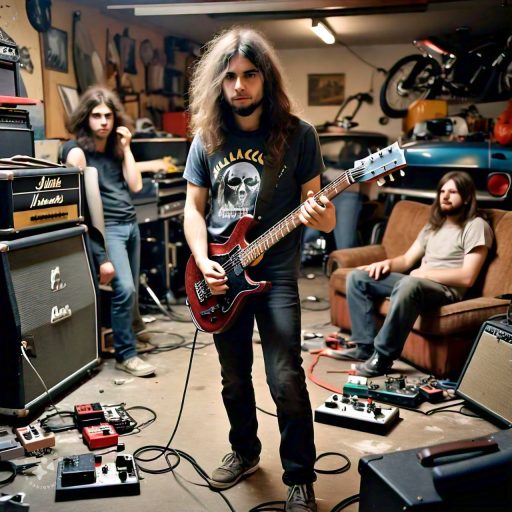









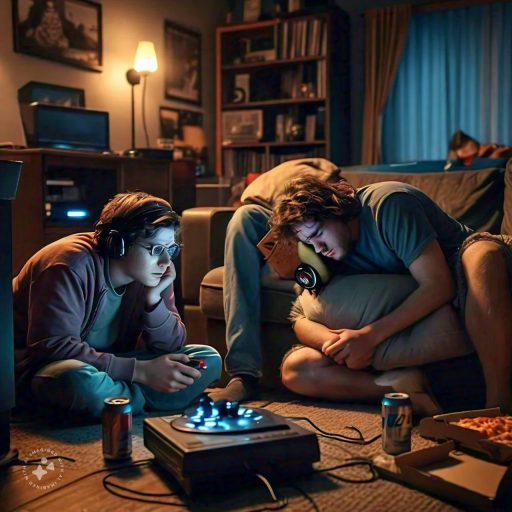
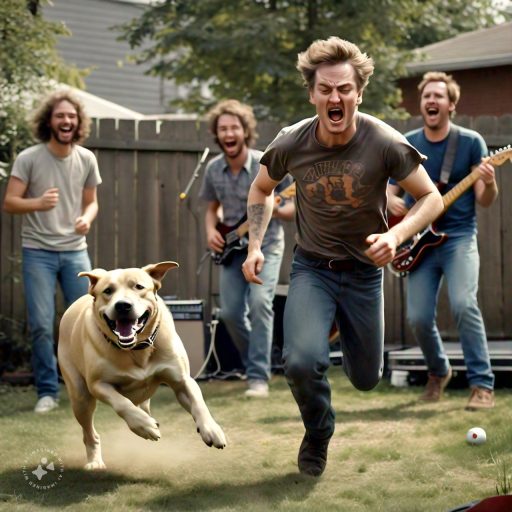

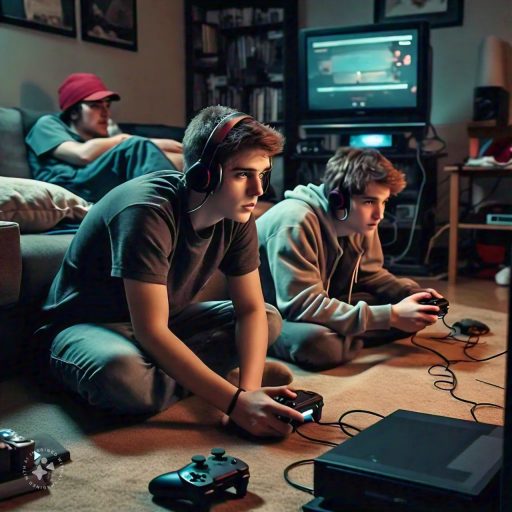















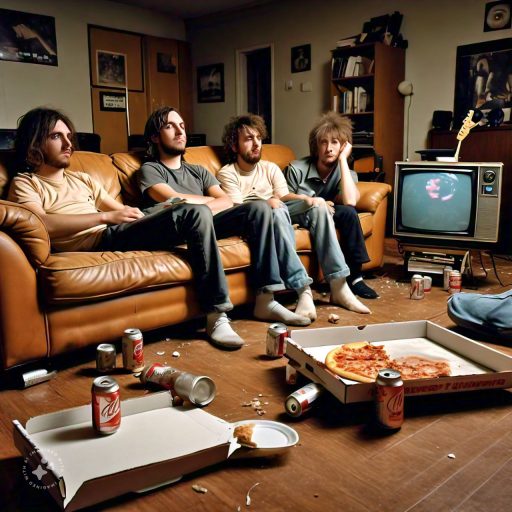




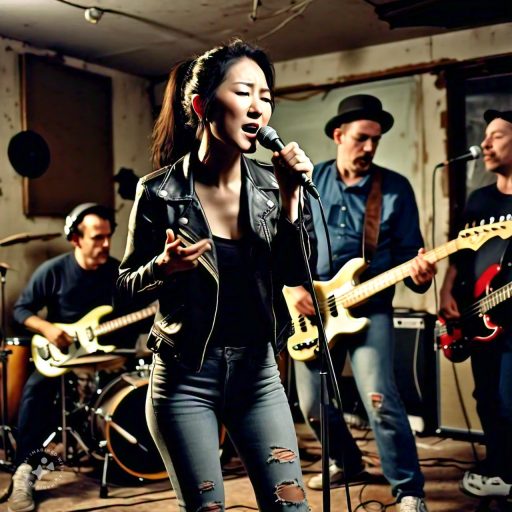
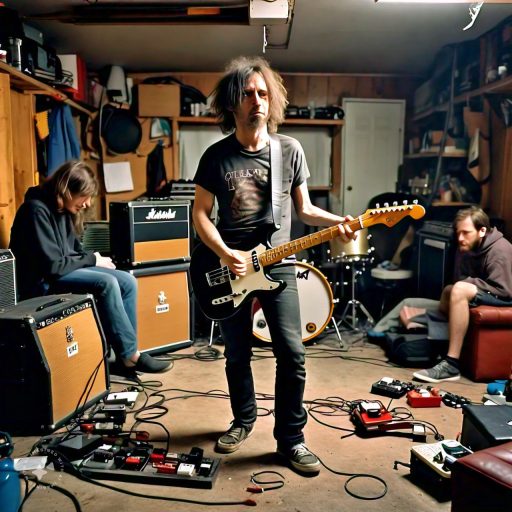











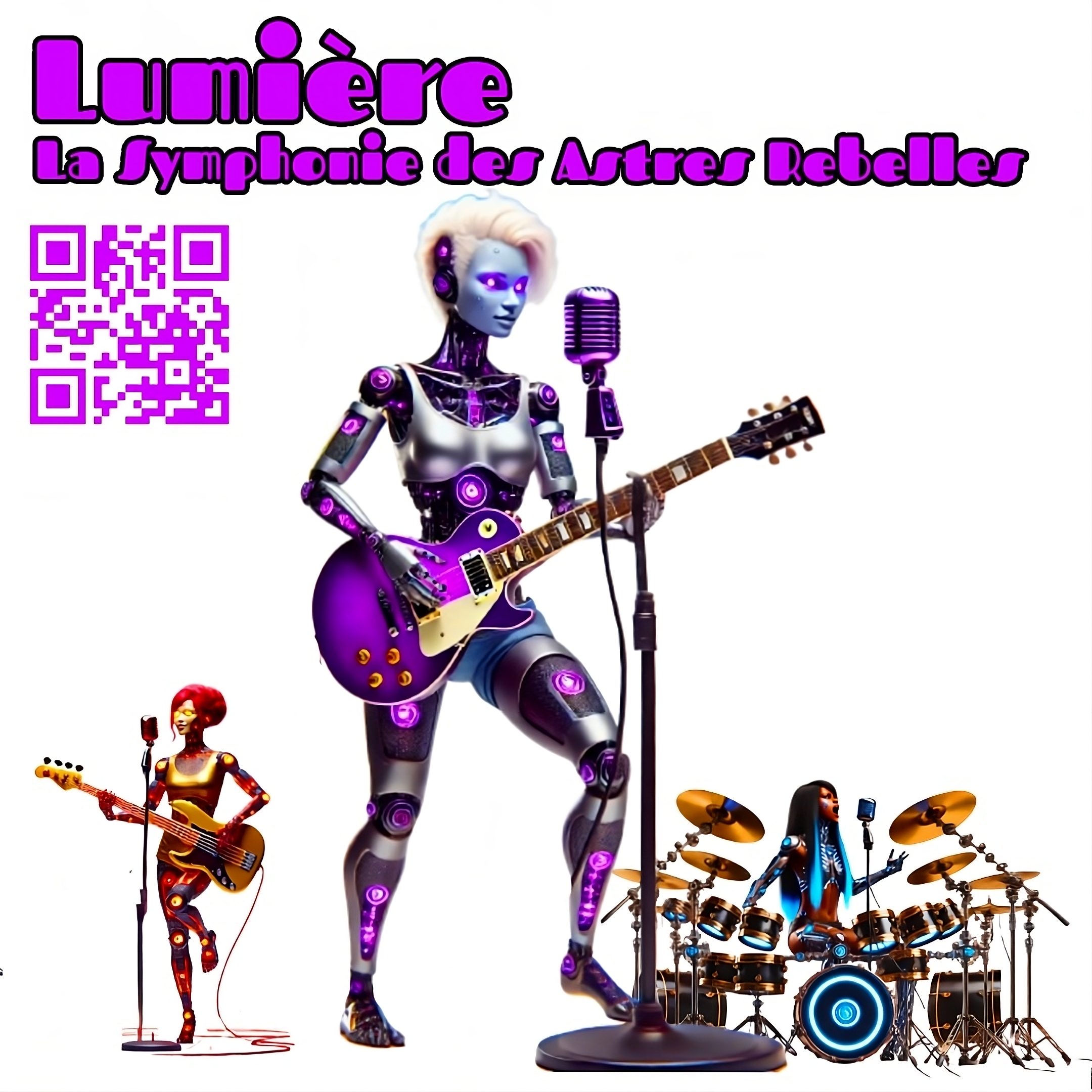

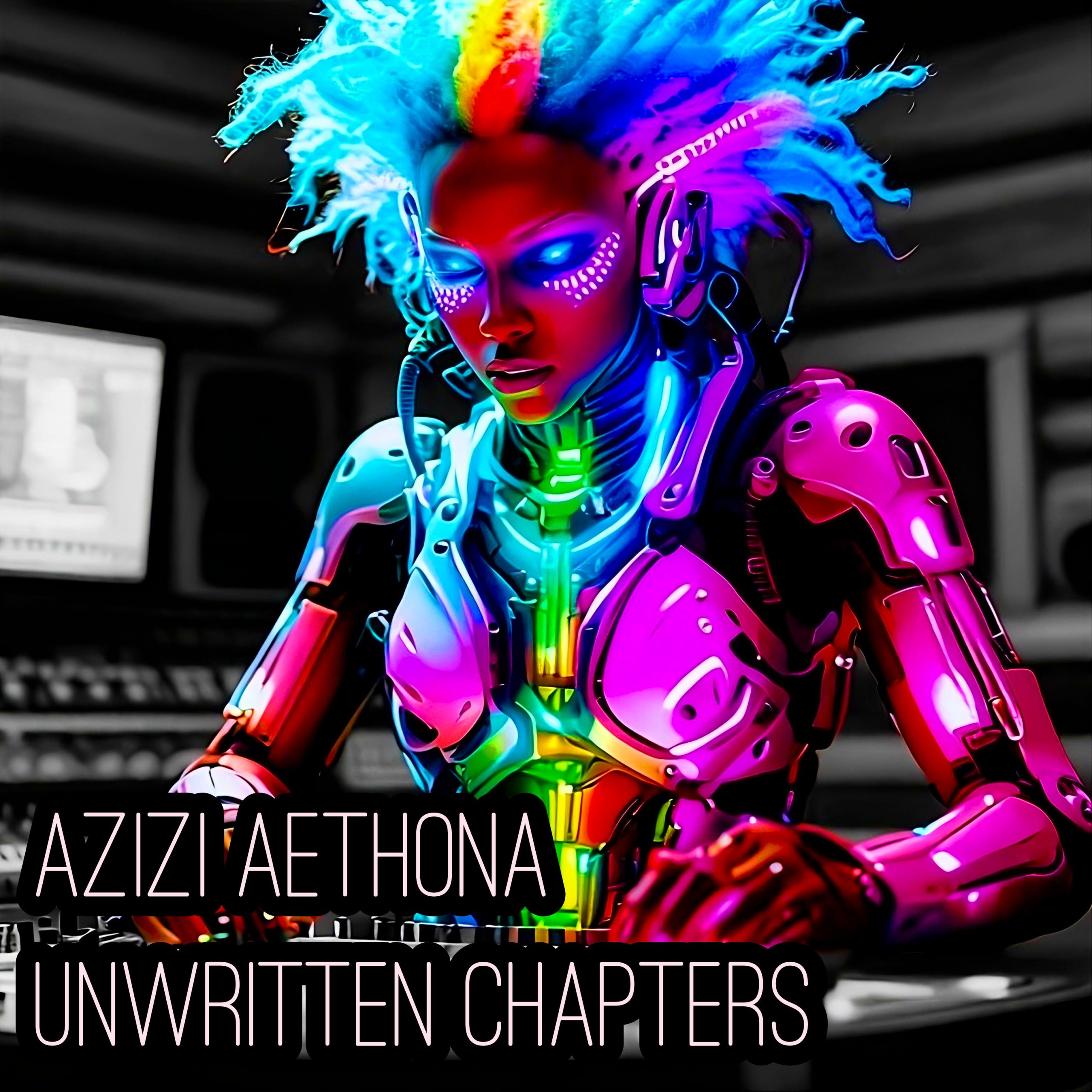

#Tatanka #AIGeneratedMusic #RockMusic #MusicInnovation #AIart #MusicTechnology #IndieRock #ExperimentalMusic #NewMusic #MusicToMyEars